waa.c File Reference
Handling of multiple struct estats, WAA (working copy administrative area) function.
More...
#include <fcntl.h>#include <sys/stat.h>#include <sys/types.h>#include <errno.h>#include <apr_pools.h>#include <apr_md5.h>#include <subversion-1/svn_md5.h>#include <ctype.h>#include <unistd.h>#include <strings.h>#include <time.h>#include <sys/mman.h>#include "waa.h"#include "interface.h"#include "direnum.h"#include "options.h"#include "add_unvers.h"#include "cache.h"#include "checksum.h"#include "helper.h"#include "global.h"#include "status.h"#include "est_ops.h"#include "ignore.h"#include "actions.h"
Go to the source code of this file.
Data Structures | |
| struct | waa___temp_names_t |
Defines | |
| #define | TREE_DAMAGED(condition,...) |
| Small helper macro for telling the user that the file is damaged. | |
Functions | |
| void | waa___init_path (enum opt__settings_e which, char *dest, char **eos) |
| Convenience function for creating two paths. | |
| int | waa__init (void) |
| -. | |
| int | waa__save_cwd (char **where, int *ret_len, int additional) |
| -. | |
| int | waa__mkdir (char *dir, int including_last) |
| -. | |
| int | waa__mkdir_mask (char *dir, int including_last, int mask) |
| -. | |
| int | waa___get_path_md5 (const char const *path, unsigned char digest[APR_MD5_DIGESTSIZE]) |
| Returns the MD5 of the given path, taking the softroot into account. | |
| int | waa__get_waa_directory (char *path, char **erg, char **eos, char **start_of_spec, int flags) |
| -. | |
| int | waa__open (char *path, const char *extension, int flags, int *filehandle) |
| Base function to open files in the WAA. | |
| int | waa__close (int filehandle, int has_failed) |
| -. | |
| int | waa__make_info_link (char *directory, char *name, char *dest) |
| -. | |
| int | waa__given_or_current_wd (char *name, char **erg) |
| -. | |
| int | waa__delete_byext (char *path, char *extension, int ignore_not_exist) |
| -. | |
| int | waa__open_byext (char *entry_name, char *extension, int mode, int *fh) |
| -. | |
| int | waa__open_dir (char *wc_base, int write, int *fh) |
| -. | |
| int | waa__build_tree (struct estat *dir) |
| -. | |
| int | waa___find_position (struct estat **new, struct estat ***array, int count) |
| Returns the index at which the element should be (the index at which an equal or first bigger inode is). | |
| int | waa__output_tree (struct estat *root) |
| -. | |
| int | waa__update_dir (struct estat *old) |
| Checks for new entries in this directory, and updates the directory information. | |
| int | waa__input_tree (struct estat *root, struct waa__entry_blocks_t **blocks, action_t *callback) |
| -. | |
| int | waa___check_dir_for_update (struct estat *sts) |
| Check whether the conditions for update and/or printing the directory are fulfilled. | |
| int | waa___finish_directory (struct estat *sts) |
| Does an update on the specified directory, and checks for completeness. | |
| int | waa__update_tree (struct estat *root, struct waa__entry_blocks_t *cur_block) |
| -. | |
| int | waa__read_or_build_tree (struct estat *root, int argc, char *normalized[], char *orig[], action_t *callback, int return_ENOENT) |
| -. | |
| int | waa__find_common_base2 (int argc, char *args[], char ***normalized, int flags) |
| -. | |
| int | waa__partial_update (struct estat *root, int argc, char *normalized[], char *orig[], struct waa__entry_blocks_t *blocks) |
| -. | |
| int | waa__new_entry_block (struct estat *entry, int count, struct waa__entry_blocks_t *previous) |
| -. | |
| int | waa__find_base (struct estat *root, int *argc, char ***args) |
| -. | |
| int | waa___recurse_tree (struct estat **list, action_t handler, int(*me)(struct estat *, action_t)) |
| Abbreviation function for tree recursion. | |
| int | waa__do_sorted_tree (struct estat *root, action_t handler) |
| -. | |
| int | waa__dir_enum (struct estat *this, int est_count, int by_name) |
| -. | |
| int | waa__copy_entries (struct estat *src, struct estat *dest) |
| -. | |
| int | waa__get_tmp_name (const char *base_dir, char **output, apr_file_t **handle, apr_pool_t *pool) |
| -. | |
| int | waa__set_working_copy (const char const *wc_dir) |
| -. | |
| int | waa__create_working_copy (const char const *wc_dir) |
| -. | |
Variables | |
| static const char | ext_tmp [] = ".tmp" |
| The extension temporary files in the WAA get. | |
| static struct sstat_t | waa_stat |
| The meta-data for the WAA base directory. | |
| static unsigned | max_path_len |
| The maximum path length encountered so far. | |
| struct url_t ** | urllist = NULL |
| -. | |
| int | urllist_count = 0 |
| -. | |
| unsigned | approx_entry_count |
| How many entries we have; this is used to show the user some kind of progress report, in percent. | |
| static struct waa___temp_names_t * | target_name_array = NULL |
| This array stores the target names. | |
| static int | target_name_array_len = 0 |
| How many entries have been in use in the target_name_array. | |
| int | waa_tmp_path_len |
| -. | |
| struct waa__entry_blocks_t | waa__entry_block |
| -. | |
| char * | wc_path |
| -. | |
| int | wc_path_len |
| -. | |
| const char | waa__header_line [] = "%u %lu %u %u %u %u" |
| The header line of the dir-files. | |
| char * | waa_tmp_path |
| -. | |
| char * | waa_tmp_fn |
| char * | conf_tmp_path |
| char * | conf_tmp_fn |
Detailed Description
Handling of multiple struct estats, WAA (working copy administrative area) function.
In other words, handling single directories or complete trees of entries (whereas est_ops.c is concerned with operations on single entries).
- Note:
- WAA is short for Working copy Administrative Area, ie. the directory hierarchy where local data concerning the remote state and some caches are stored.
This is not needed for all operations; eg. an export works without it.
Definition in file waa.c.
Define Documentation
| #define TREE_DAMAGED | ( | condition, | |||
| ... | ) |
STOPIF_CODE_ERR( condition, EINVAL, \ "!The entries file seems to be damaged -- \n" \ " %s.\n" \ "\n" \ "Please read the users@ mailing list.\n" \ " If you know what you're doing you could " \ "try using 'sync-repos'\n" \ " (but please _read_the_documentation_!)\n" \ " 'We apologize for the inconvenience.'", \ __VA_ARGS__);
Small helper macro for telling the user that the file is damaged.
Definition at line 1594 of file waa.c.
Referenced by waa__input_tree().
Function Documentation
| int waa___check_dir_for_update | ( | struct estat * | sts | ) | [inline] |
Check whether the conditions for update and/or printing the directory are fulfilled.
A directory has to be printed
- when it is to be fully processed (and not only walked through because of some children),
- and either
- it has changed (new or deleted entries), or
- it was freshly added.
Definition at line 1836 of file waa.c.
References ac__dispatch, action, CHCHECK_DIRS, DEBUGP, estat::do_this_entry, actionlist_t::do_update_dir, estat::entry_status, estat::flags, estat::name, ops__allowed_by_filter(), ops__are_children_interesting(), ops__calc_filter_bit(), OPT__CHANGECHECK, RF_ADD, RF_CHECK, STOPIF, and waa__update_dir().
Referenced by waa___finish_directory().
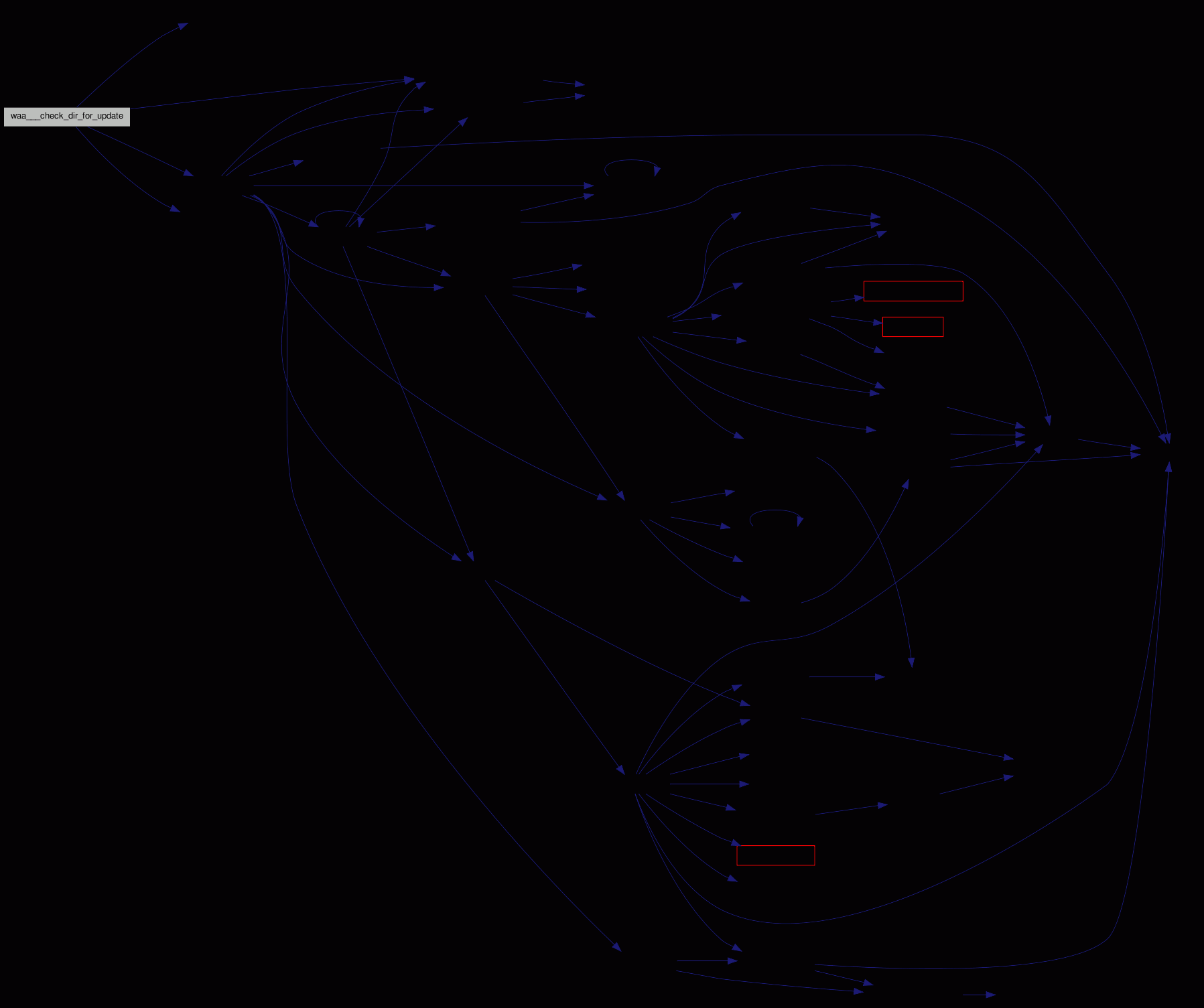
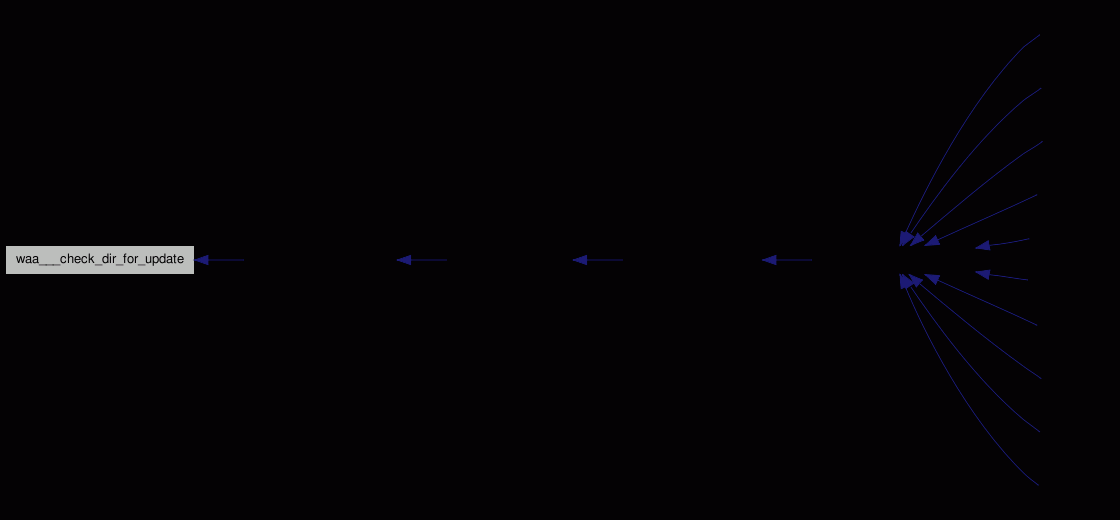
Returns the index at which the element should be (the index at which an equal or first bigger inode is).
Definition at line 1006 of file waa.c.
References BUG_ON, DEBUGP, dir___f_sort_by_inode(), sstat_t::ino, and estat::st.
Referenced by waa__output_tree().

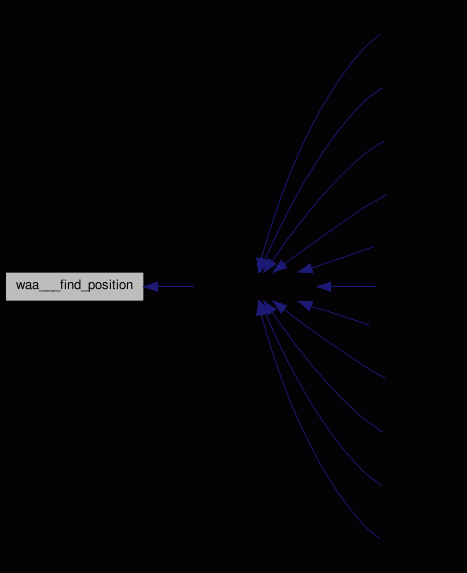
| int waa___finish_directory | ( | struct estat * | sts | ) |
Does an update on the specified directory, and checks for completeness.
We get here if all known children have been loaded, and have to look whether the subchildren are finished, too.
Definition at line 1882 of file waa.c.
References ac__dispatch, BUG_ON, estat::child_index, DEBUGP, estat::entry_count, estat::entry_status, FS_NEW, FS_REMOVED, FS_REPLACED, estat::local_mode_packed, estat::name, ops__allowed_by_filter(), OPT__FILTER, estat::parent, st__status_string(), st__status_string_fromint(), STOPIF, TEST_PACKED, estat::unfinished, and waa___check_dir_for_update().
Referenced by waa__update_tree().
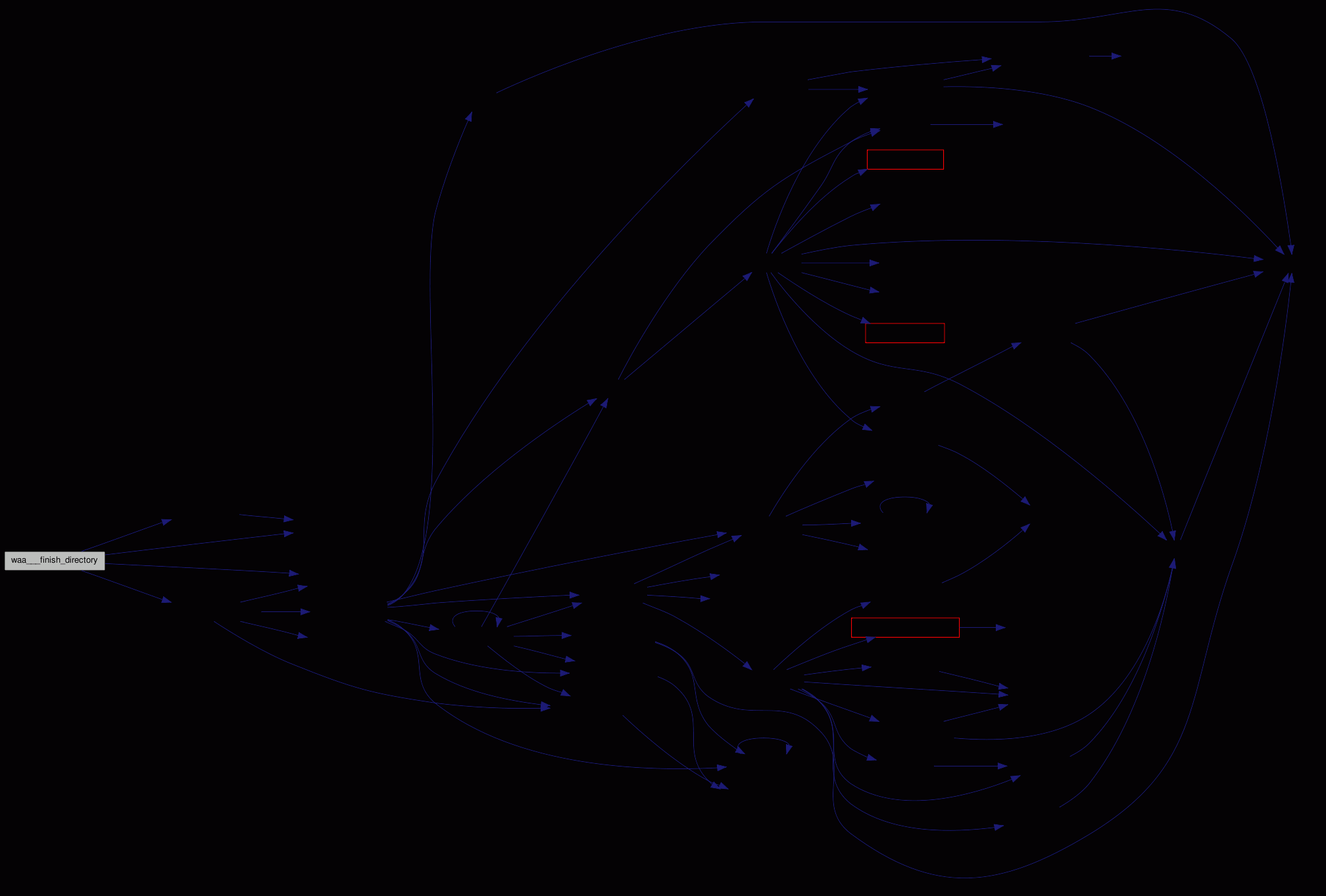
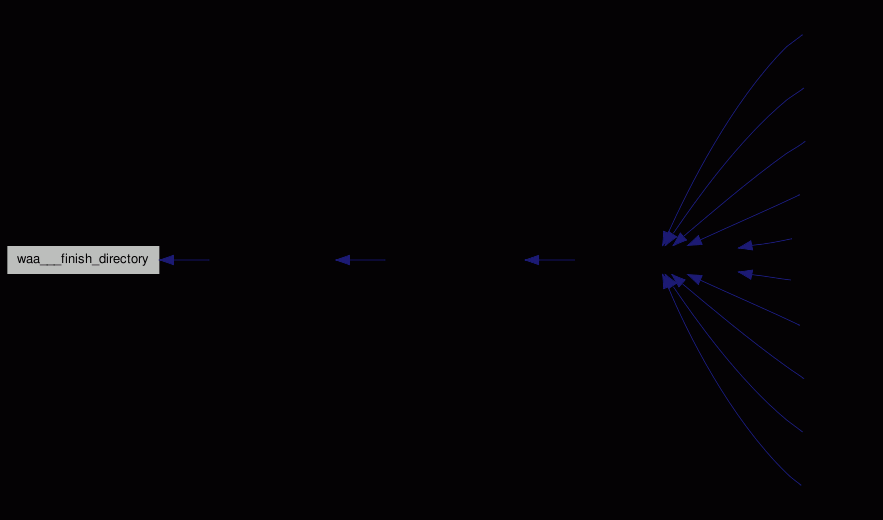
| int waa___get_path_md5 | ( | const char const * | path, | |
| unsigned char | digest[APR_MD5_DIGESTSIZE] | |||
| ) |
Returns the MD5 of the given path, taking the softroot into account.
Definition at line 399 of file waa.c.
References DEBUGP, hlp__pathcopy(), IF_FREE, OPT__SOFTROOT, PATH_SEPARATOR, STOPIF, and waa__save_cwd().
Referenced by waa__get_waa_directory().

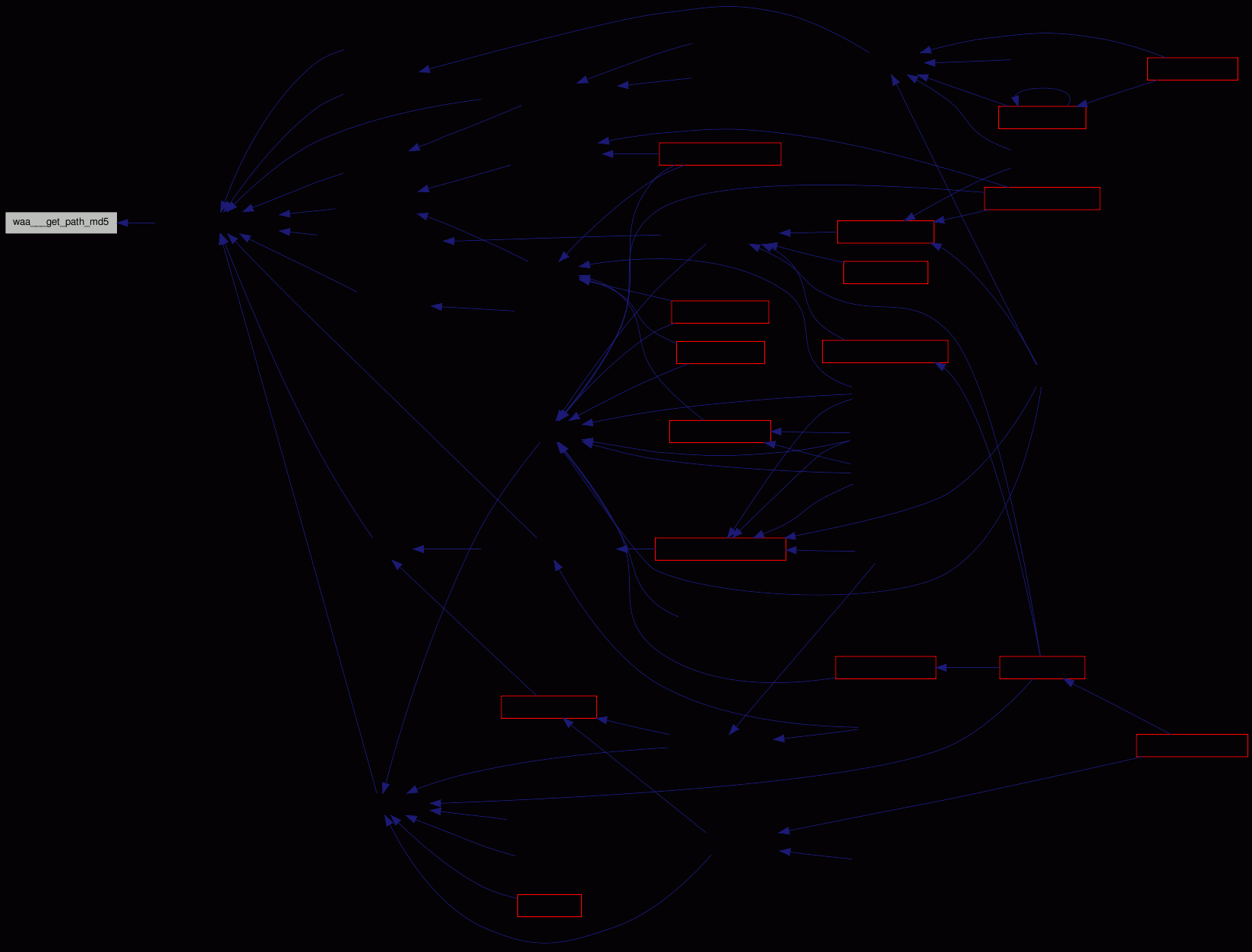
| void waa___init_path | ( | enum opt__settings_e | which, | |
| char * | dest, | |||
| char ** | eos | |||
| ) | [inline] |
Convenience function for creating two paths.
Definition at line 124 of file waa.c.
References opt__set_int(), OPT__SOFTROOT, PATH_SEPARATOR, and PRIO_MUSTHAVE.
Referenced by waa__init().


| int waa___recurse_tree | ( | struct estat ** | list, | |
| action_t | handler, | |||
| int(*)(struct estat *, action_t) | me | |||
| ) | [inline] |
Abbreviation function for tree recursion.
Definition at line 2744 of file waa.c.
References estat::do_child_wanted, estat::do_this_entry, estat::do_userselected, estat::entry_count, estat::entry_status, FS_REMOVED, estat::local_mode_packed, sstat_t::mode, ops__allowed_by_filter(), OPT__ALL_REMOVED, OPT__YES, estat::st, STOPIF, and TEST_PACKED.
Referenced by waa__do_sorted_tree().


| int waa__build_tree | ( | struct estat * | dir | ) |
-.
Creates the entries tree below root .
All entries are defined as new.
Definition at line 940 of file waa.c.
References ac__dispatch, approx_entry_count, estat::by_inode, DEBUGP, estat::entry_count, estat::entry_status, FS_NEW, ign__is_ignore(), sstat_t::mode, estat::name, ops__are_children_interesting(), ops__free_marked(), ops__mark_changed_parentcc, ops__set_todo_bits(), estat::st, STOPIF, STOPIF_CODE_ERR, estat::to_be_ignored, waa__build_tree(), and waa__dir_enum().
Referenced by bld__work(), waa__build_tree(), and waa__update_dir().
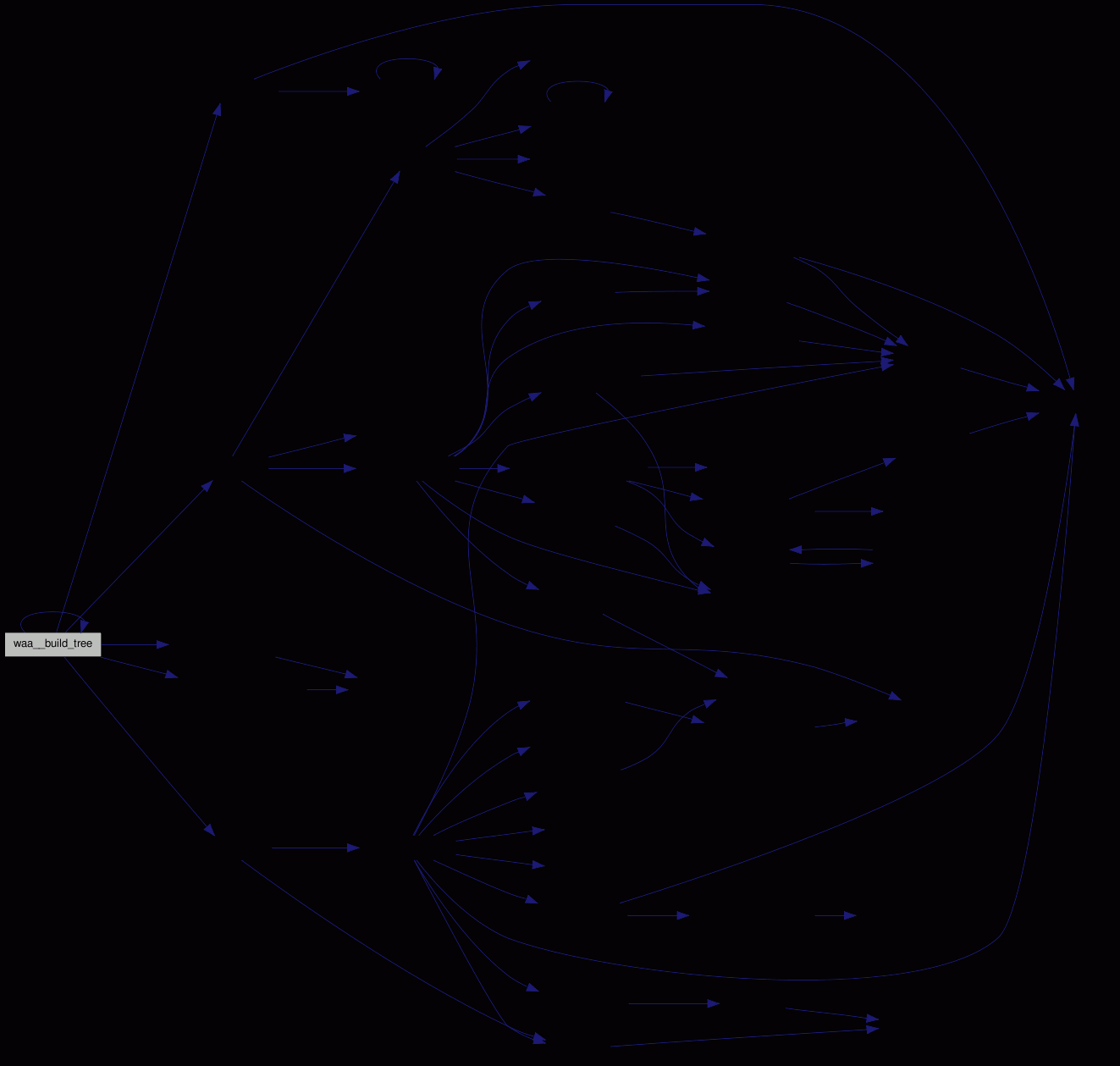

| int waa__close | ( | int | filehandle, | |
| int | has_failed | |||
| ) |
-.
This function closes a writable filehandle that was opened in the WAA via waa__open().
If has_failed is !=0, the writing to the file has failed somewhere; so the temporary file is not renamed to the destination name, just removed.
This may be called only for writeable files of waa__open() and similar; readonly files should just be close()d.
Definition at line 713 of file waa.c.
References DEBUGP, waa___temp_names_t::dest_name, IF_FREE, STOPIF, STOPIF_CODE_ERR, waa___temp_names_t::temp_name, and waa__mkdir().
Referenced by cs___mnbs_close(), ign__save_ignorelist(), res__mark_conflict(), res__remove_aux_files(), url__output_list(), and waa__output_tree().

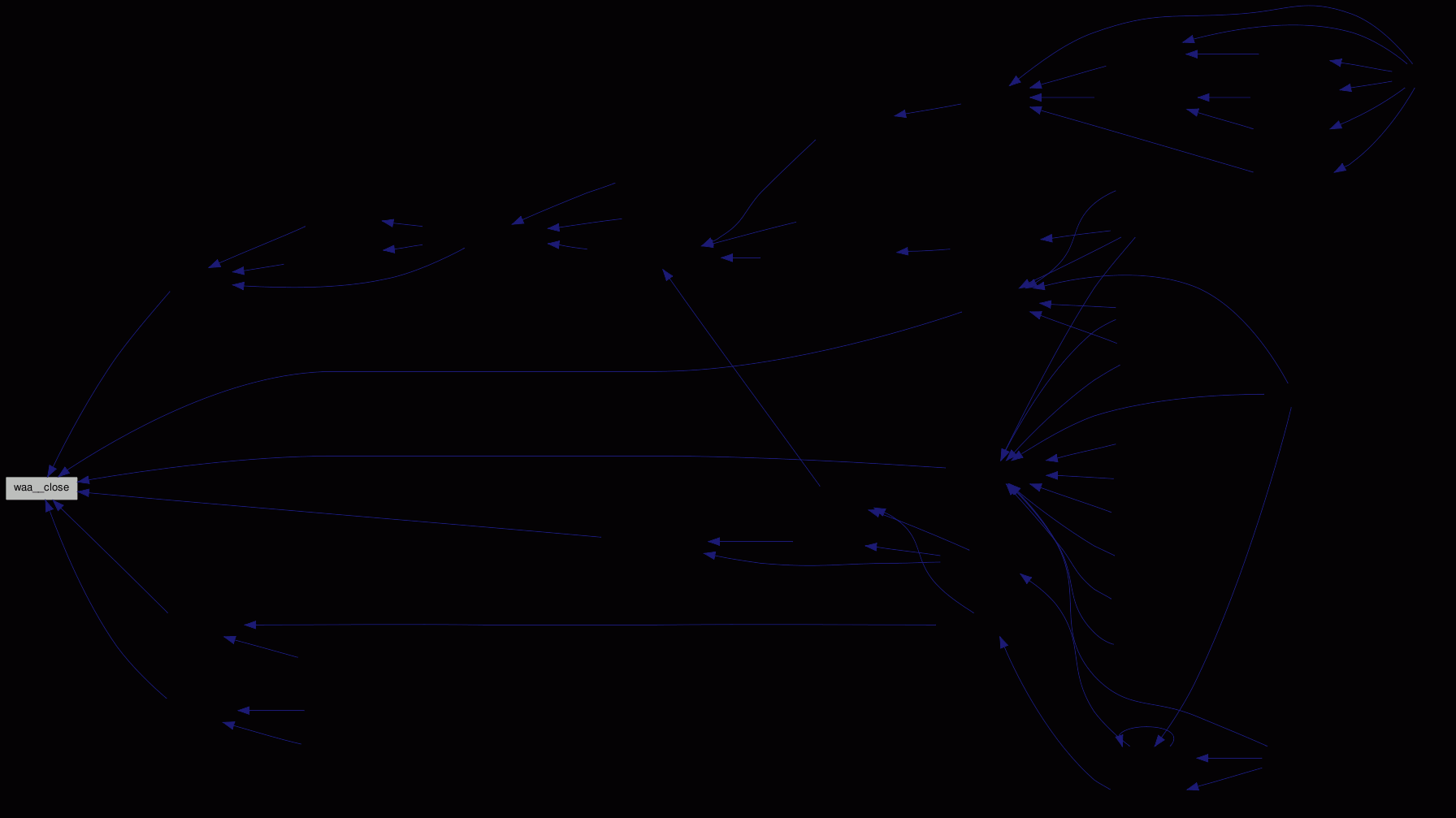
-.
Copies all sub-entries of src to dest.
dest must already exist; its name is not overwritten, as it is (usually) different for the copy base entry.
Existing entries of dest are not replaced or deleted; other entries are appended, with a status of FS_REMOVED.
This works for both directory and non-directory entries.
Definition at line 2850 of file waa.c.
References estat::by_name, estat::entry_count, hlp__calloc(), IF_FREE, sstat_t::mode, estat::name, ops__allocate(), ops__copy_single_entry(), ops__correlate_dirs(), ops__new_entries(), estat::parent, estat::st, STOPIF, and waa__copy_entries().
Referenced by cm___make_copy(), and waa__copy_entries().


| int waa__create_working_copy | ( | const char const * | wc_dir | ) |
-.
Creates the WAA and CONF directories needed for wc_path.
The dir must be absolute; this function makes an own copy, so the value will be unchanged.
Definition at line 3015 of file waa.c.
References BUG_ON, GWD_CONF, GWD_MKDIR, GWD_WAA, STOPIF, waa__get_waa_directory(), waa__make_info_link(), waa__mkdir(), waa__set_working_copy(), and wc_path.
Referenced by co__work(), and url__work().


| int waa__delete_byext | ( | char * | path, | |
| char * | extension, | |||
| int | ignore_not_exist | |||
| ) |
-.
This function takes a path and an extension and tries to remove the associated file in the WAA.
If the unlink()-call succeeds, the (max. 2) directory levels above are removed, if possible.
Via the parameter ignore_not_exist the caller can say whether a ENOENT should be returned silently.
If extension is NULL, the given path already specifies a file, and is not converted into a WAA path.
- See also:
- Files used by fsvs.
Definition at line 837 of file waa.c.
References BUG_ON, DEBUGP, PATH_SEPARATOR, STOPIF, waa__get_gwd_flag(), and waa__get_waa_directory().
Referenced by hsh__close(), ign__save_ignorelist(), res__remove_aux_files(), rev__install_file(), sync__progress(), sync__work(), and up__unlink().

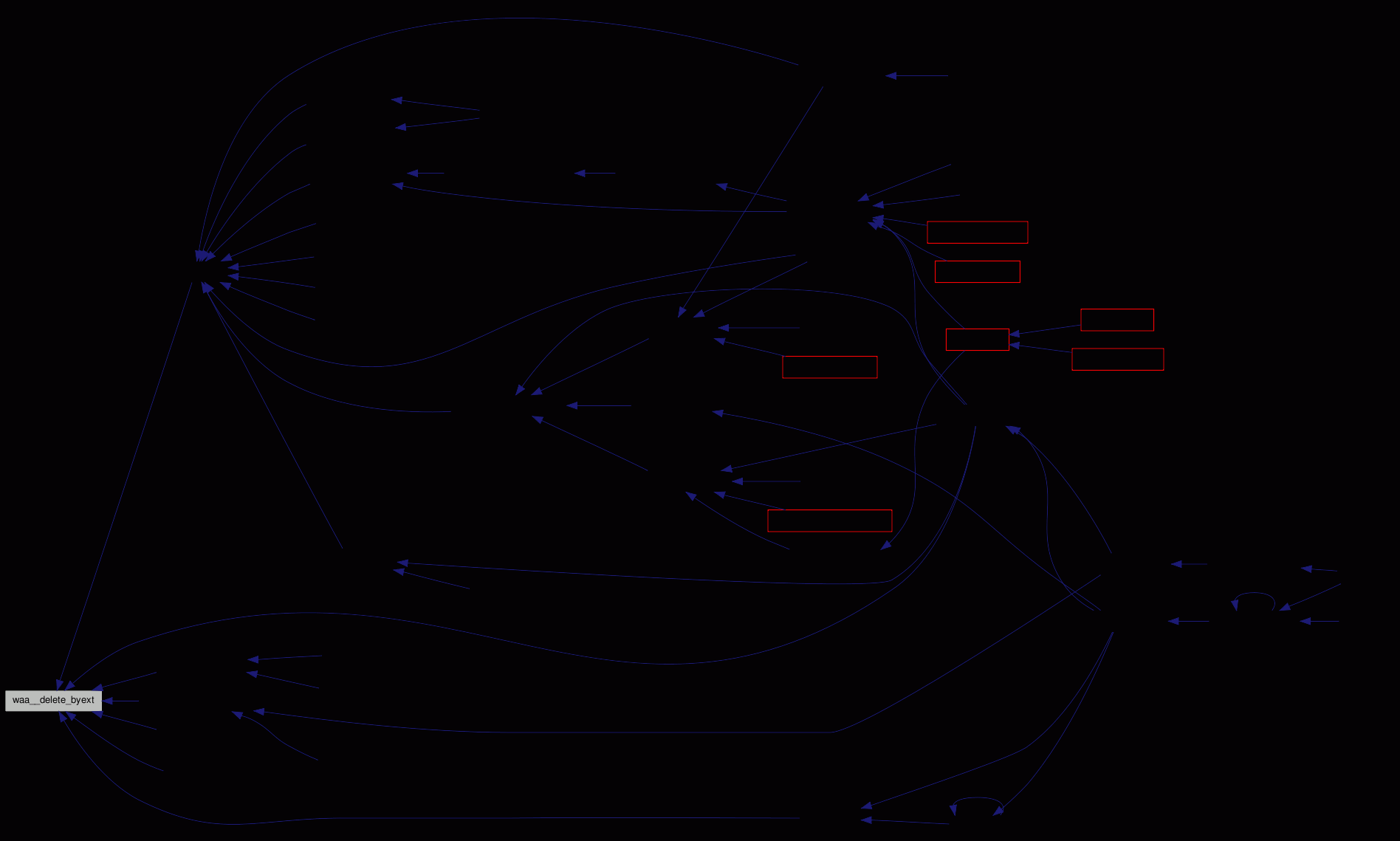
| int waa__dir_enum | ( | struct estat * | this, | |
| int | est_count, | |||
| int | by_name | |||
| ) |
-.
A wrapper around dir__enumerator(), ignoring entries below $FSVS_WAA.
The cwd is the directory to be looked at.
IIRC the inode numbers may change on NFS; but having the WAA on NFS isn't a good idea, anyway.
Definition at line 2814 of file waa.c.
References DEBUGP, sstat_t::dev, dir__enumerator(), hlp__lstat(), sstat_t::ino, STOPIF, and waa_stat.
Referenced by waa__build_tree(), and waa__update_dir().
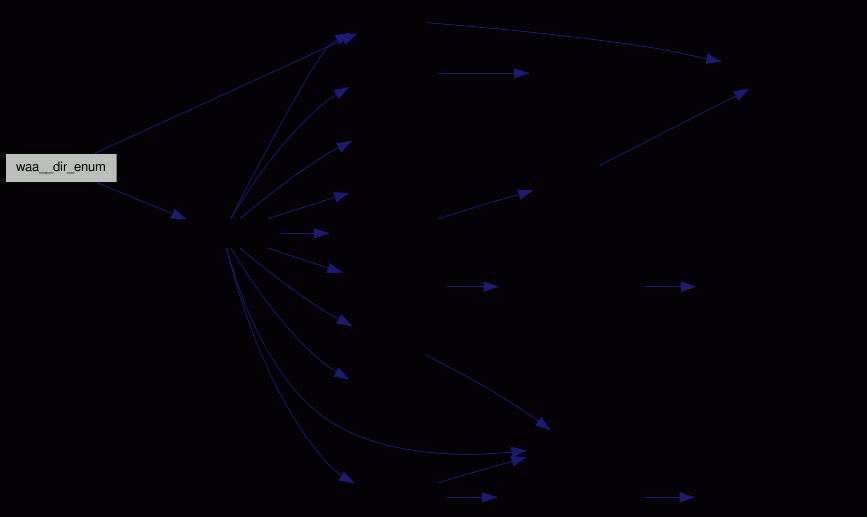

-.
This function traverses the tree and calls the handler function for the marked entries; directories before their children, and in order sorted by name.
Definition at line 2784 of file waa.c.
References estat::by_name, dir__sortbyname(), estat::do_this_entry, IF_FREE, estat::parent, STOPIF, waa___recurse_tree(), and waa__do_sorted_tree().
Referenced by st__work(), and waa__do_sorted_tree().


| int waa__find_base | ( | struct estat * | root, | |
| int * | argc, | |||
| char *** | args | |||
| ) |
-.
Similar to waa__find_common_base, but allows only specification of a WC root.
Definition at line 2712 of file waa.c.
References estat::arg, STOPIF, STOPIF_CODE_ERR, and waa__find_common_base().
Referenced by bld__work(), delay__work(), sync__work(), and up__work().
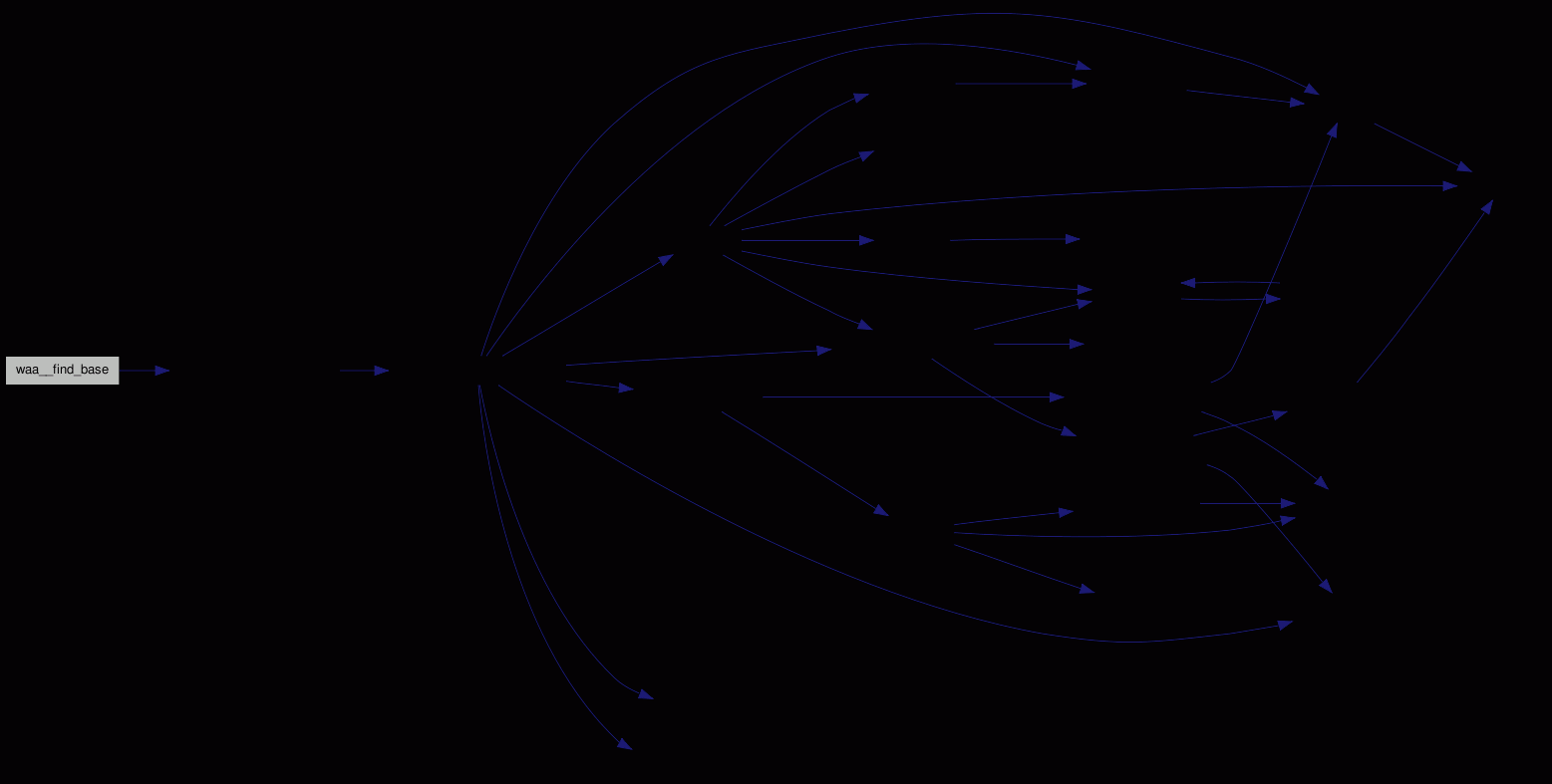
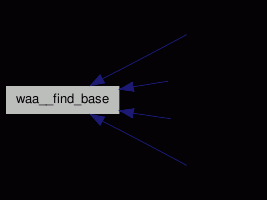
| int waa__find_common_base2 | ( | int | argc, | |
| char * | args[], | |||
| char *** | normalized, | |||
| int | flags | |||
| ) |
-.
Given a list of path arguments the base path and relative paths are returned.
This function calculates the common root of the given paths, and tries to find a working copy base there (or above). It returns the paths of the parameters relative to the base found.
Eg.: for /a/wc/sub/sub2 and /a/wc/file it returns
base=/a/wcnormalized[0] =sub/sub2normalized[1] =file
We have to find a wc root before we can load the entries file; so we'd have to process the given paths twice, possibly each time by prepending the current working directory and so on; that's why this function returns a block of relative path pointers. These have just to be walked up to the root to process them (eg. mark for processing).
*normalized should be free()d after use; but as the converted arguments are all allocated one by one it won't help that much.
- Note:
- In case no matching base is found, the common part of the paths is returned as base, and the paths are normalized relative to it.
ENOENTis returned.
- Todo:
- Should that be changed to base="/"?
If we get no parameters, we fake the current working directory as parameter and return it in normalized[0]. argc in the caller will still be 0!
- If we have a dir-file, we look only from the current directory below - so fake a parameter.
- If we have no dir-file:
- If we find a base, we fake a parameter and show only below.
- If we find no base, we believe that we're at the root of the wc.
The parameter must not be shown as "added" ("n...") - because it isn't.
For the case that the WC root is "/", and we shall put a "./" in front of the normalized paths, we need an additional byte per argument, so that eg. "/etc" can be changed to "./etc" - see the PDS comments.
In order to correctly handle cases like "/symlink/to/a/directory/subd/file", we do a realpath() call of the directory of the argument (with ".../" assumed to be ".../."), and use that as base path for the filename.
Definition at line 2291 of file waa.c.
References action, BUG_ON, DEBUGP, FCB__NO_REALPATH, FCB__PUT_DOTSLASH, FILTER__ALL, FSVS_EXP_WC_CONF, FSVS_EXP_WC_ROOT, GWD_CONF, hlp__alloc(), hlp__pathcopy(), hlp__strnalloc(), IF_FREE, actionlist_t::only_opt_filter, OPT__FILTER, opt__load_settings(), opt__set_int(), PATH_SEPARATOR, PRIO_ETC_WC, PRIO_MUSTHAVE, st__status_string_fromint(), start_path, start_path_len, STOPIF, STOPIF_CODE_ERR, waa__get_waa_directory(), waa__open(), wc_path, and wc_path_len.
Referenced by ign__rign(), and waa__find_common_base().
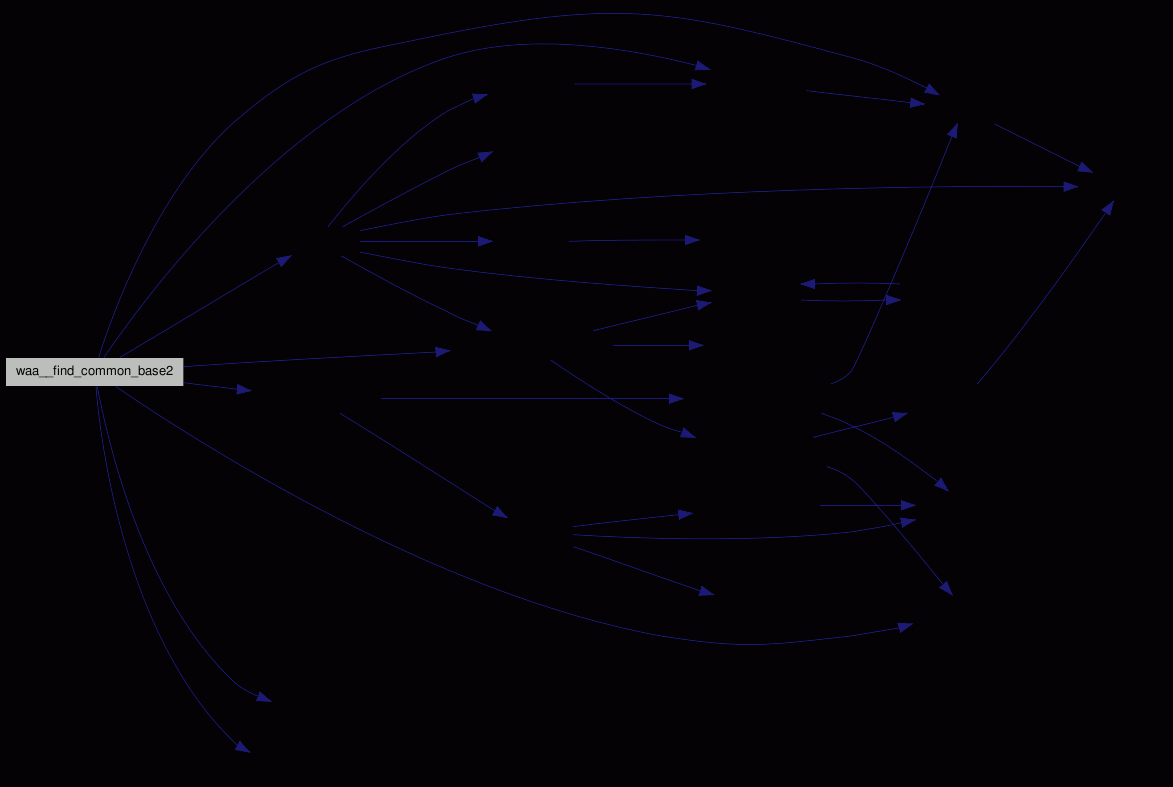
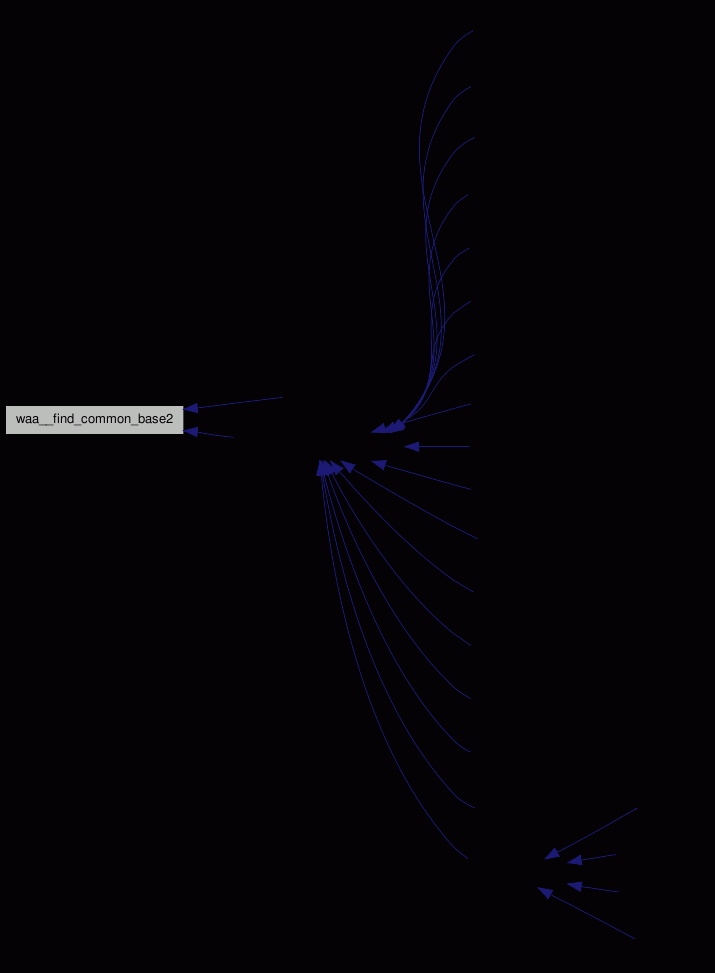
| int waa__get_tmp_name | ( | const char * | base_dir, | |
| char ** | output, | |||
| apr_file_t ** | handle, | |||
| apr_pool_t * | pool | |||
| ) |
-.
Returns a distict name and filehandle.
If base_dir is NULL, a default path is taken; else the string is copied and gets an arbitrary postfix. If base_dir ends in PATH_SEPARATOR, "fsvs" is inserted before the generated postfix.
*output gets set to the generated filename, and must not be free()d.
Definition at line 2923 of file waa.c.
References BUG_ON, cch__add(), cch__entry_set(), cache_entry_t::data, filename, cache_entry_t::len, PATH_SEPARATOR, and STOPIF.
Referenced by cb__open_tmp(), ci__getmsg(), df___type_def_diff(), rev__get_text_to_tmpfile(), and rev__install_file().

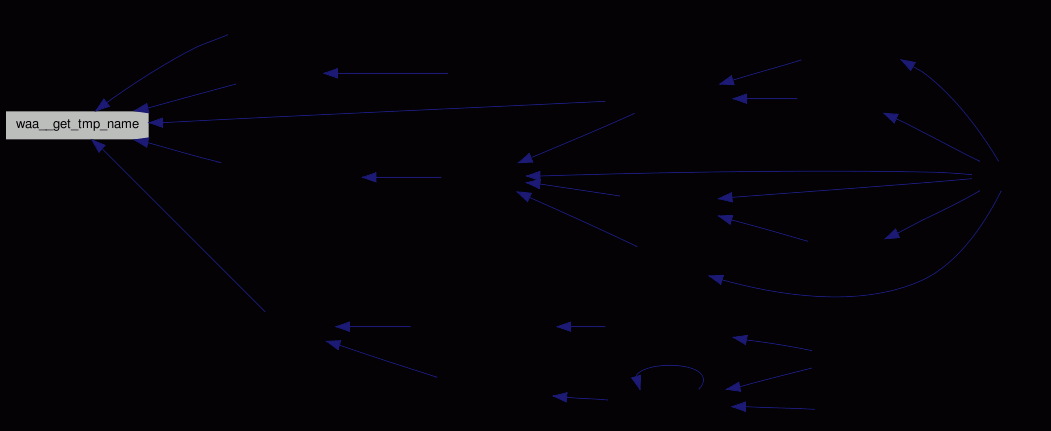
| int waa__get_waa_directory | ( | char * | path, | |
| char ** | erg, | |||
| char ** | eos, | |||
| char ** | start_of_spec, | |||
| int | flags | |||
| ) |
-.
This function determines the directory used in the WAA area for the given path.
In erg a pointer to an static buffer (at least as far as the caller should mind!) is returned; eos, if not NULL, is set to the end of the string. start_of_spec points at the first character specific to this file, ie. after the constant part of $FSVS_WAA or $FSVS_CONF and the PATH_SEPARATOR.
flags tell whether the path is in the WAA (GWD_WAA) or in the configuration area (GWD_CONF); furthermore you can specify that directories should be created as needed with GWD_MKDIR.
The intermediate directories are created, so files can be created or read directly after calling this function.
Definition at line 473 of file waa.c.
References BUG, BUG_ON, conf_tmp_fn, conf_tmp_path, cs__md5tohex(), DEBUGP, GWD_CONF, GWD_MKDIR, GWD_WAA, Mbin2hex, OPT__SOFTROOT, PATH_SEPARATOR, STOPIF, waa___get_path_md5(), waa__mkdir(), waa_tmp_fn, waa_tmp_path, WAA_WC_MD5_CHARS, and wc_path.
Referenced by delay__work(), hsh___new_bare(), ign___load_group(), prp__unlink_db_for_estat(), st__print_entry_info(), waa__create_working_copy(), waa__delete_byext(), waa__find_common_base2(), waa__make_info_link(), and waa__open().

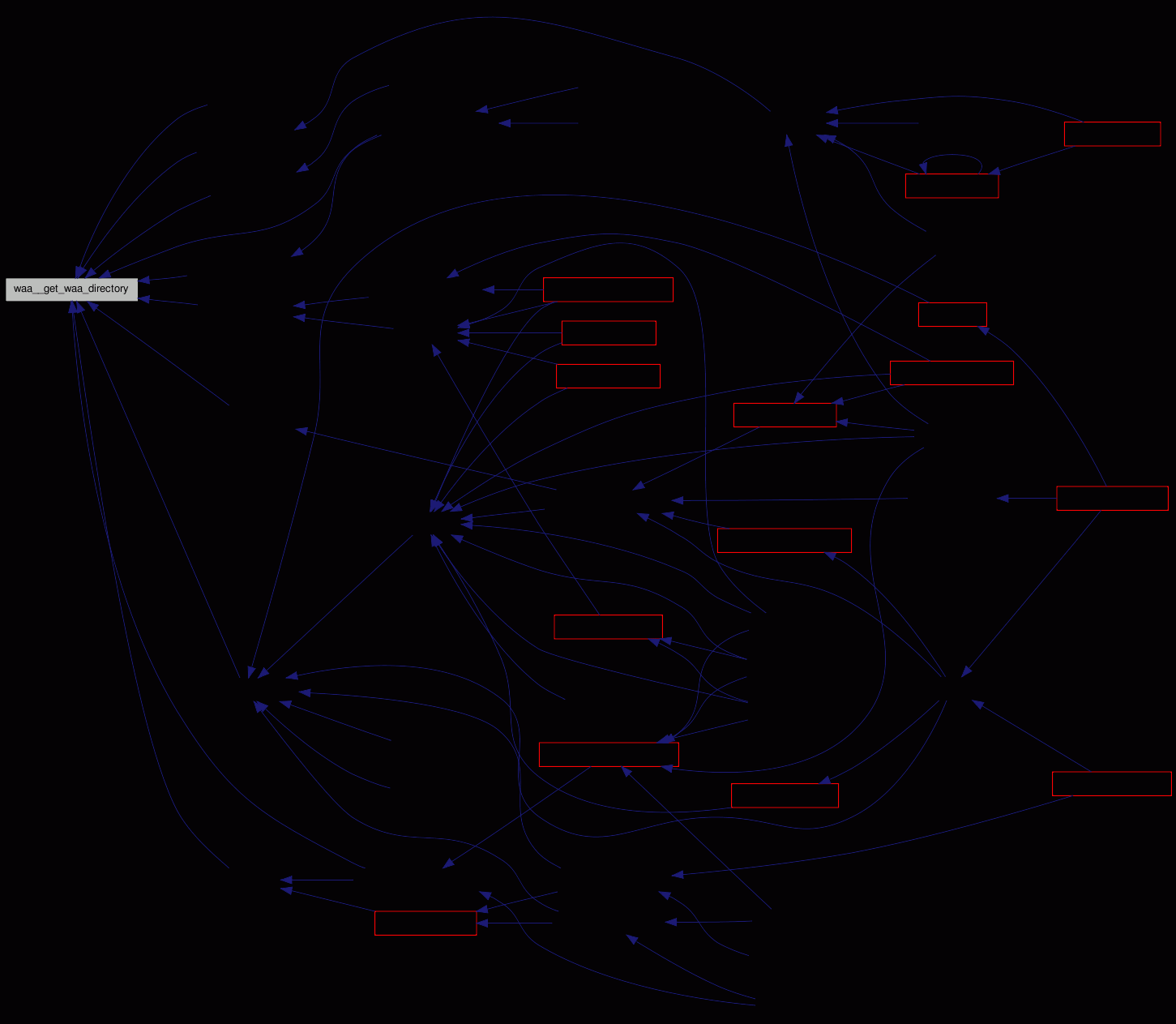
| int waa__given_or_current_wd | ( | char * | name, | |
| char ** | erg | |||
| ) |
-.
Returns the given directory or, if NULL , getcwd() .
This function takes the parameter name, and returns a freshly allocated bit of memory with the given value or - if NULL - the current working directory.
That the string is always freshly allocated on the heap makes sense in that callers can always just free it.
Definition at line 809 of file waa.c.
References hlp__strdup(), STOPIF, and waa__save_cwd().
Referenced by url__work(), and waa__open_byext().

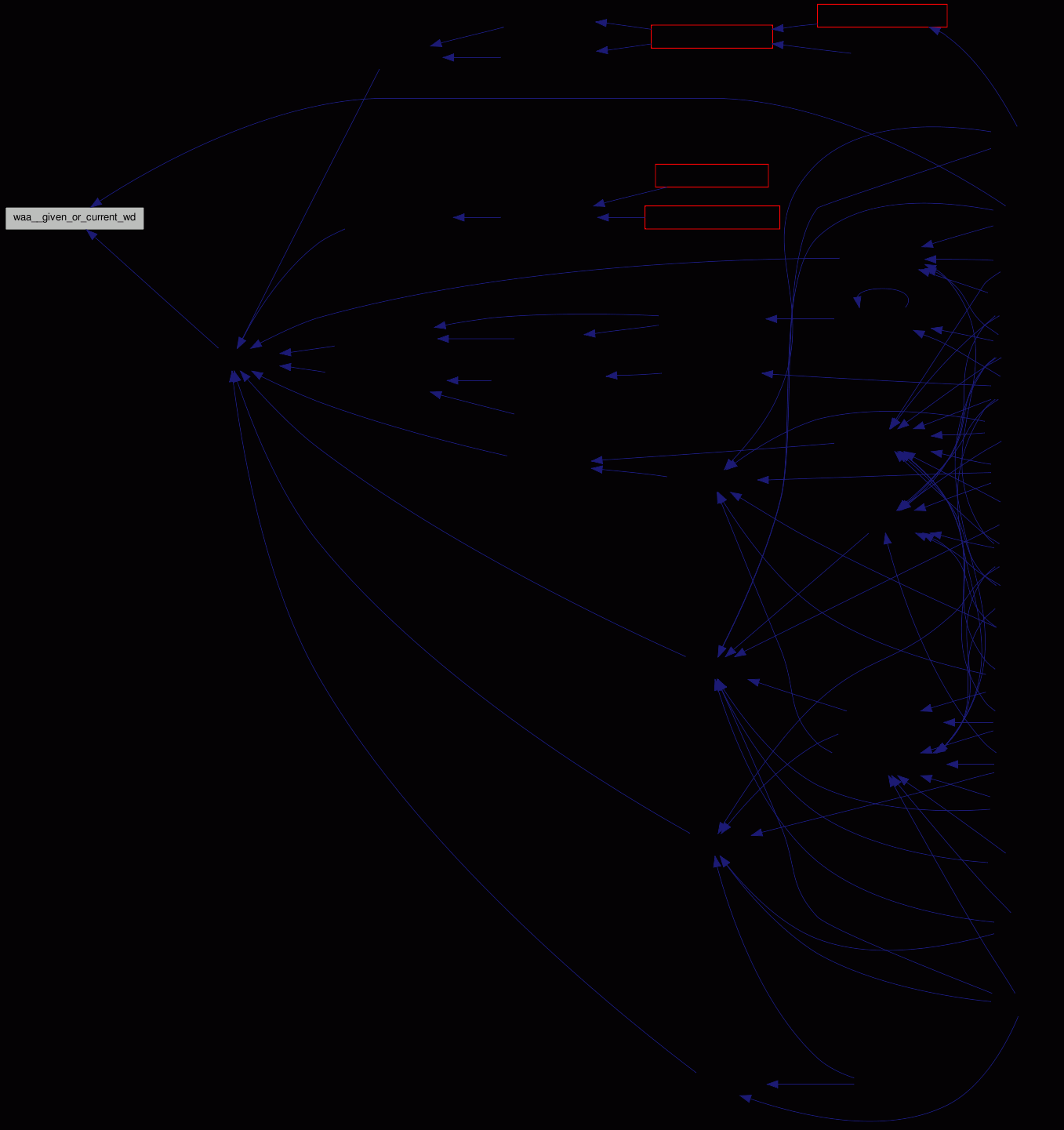
| int waa__init | ( | void | ) |
-.
Initialize WAA operations.
If not a WAA-less operation, find the WAA and define an ignore pattern.
- Todo:
- remove when gcc doesn't warn about
strlen("const") initializers. See debian bug #60xxxx. And see below for WAA_PATH, too.
Definition at line 159 of file waa.c.
References action, conf_tmp_fn, conf_tmp_path, DEBUGP, DEFAULT_CONF_PATH, DEFAULT_CONFIGDIR_SUB, DEFAULT_WAA_PATH, ext_tmp, hlp__alloc(), hlp__lstat(), hlp__pathcopy(), sstat_t::ino, actionlist_t::is_import_export, actionlist_t::is_readonly, max, OPT__CONF_PATH, OPT__CONFIG_DIR, opt__set_int(), opt__set_string(), OPT__SOFTROOT, opt__variable_from_option(), OPT__WAA_PATH, PRIO_MUSTHAVE, STOPIF, STOPIF_CODE_ERR, waa___init_path(), WAA__MAX_EXT_LENGTH, waa_stat, waa_tmp_fn, waa_tmp_path, waa_tmp_path_len, and WAA_WC_MD5_CHARS.
Referenced by main().
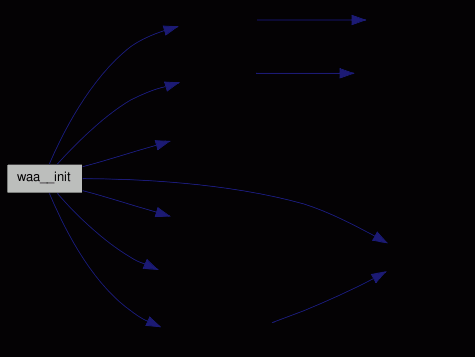

| int waa__input_tree | ( | struct estat * | root, | |
| struct waa__entry_blocks_t ** | blocks, | |||
| action_t * | callback | |||
| ) |
-.
Read the dir file for the current working directory.
This may silently return -ENOENT, if the waa__open fails.
The callback is called for every entry read; but for performance reasons the path parameter will be NULL.
Definition at line 1613 of file waa.c.
References approx_entry_count, BUG_ON, estat::by_inode, estat::child_index, waa__entry_blocks_t::count, DEBUGP, estat::entry_count, filename, waa__entry_blocks_t::first, HEADER_LEN, hlp__alloc(), max_path_len, sstat_t::mode, estat::name, waa__entry_blocks_t::next, ops__allocate(), ops__load_1entry(), estat::other_revs, estat::parent, waa__entry_blocks_t::prev, estat::repos_rev, estat::st, STOPIF, STOPIF_CODE_ERR, estat::strings, TREE_DAMAGED, waa__entry_block, waa__header_line, waa__insert_entry_block(), waa__open_dir(), WAA__READ, and WAA_VERSION.
Referenced by cat__work(), cm__uncopy(), cm__work(), log__work(), prp__s_work(), and waa__read_or_build_tree().
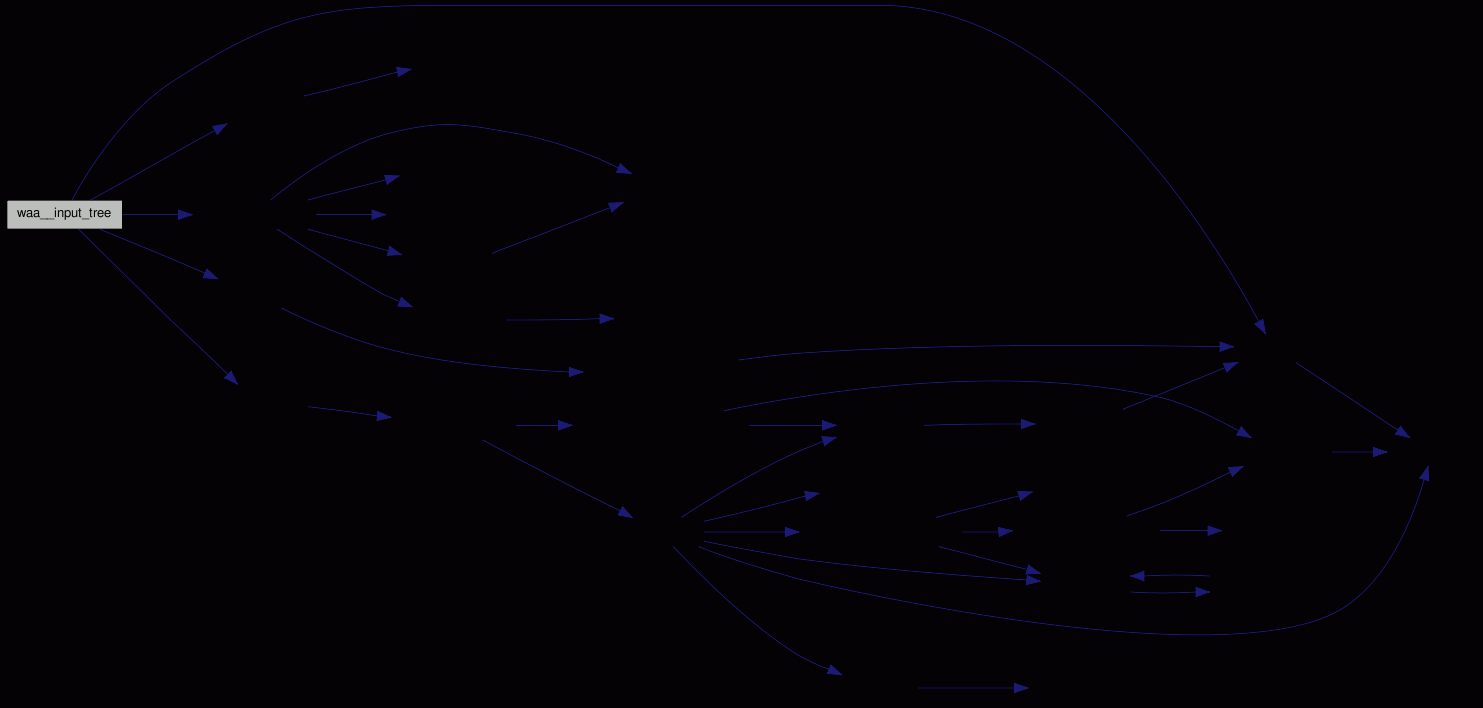
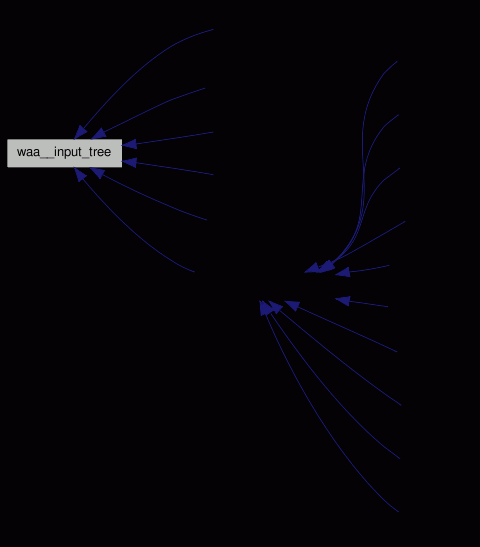
| int waa__make_info_link | ( | char * | directory, | |
| char * | name, | |||
| char * | dest | |||
| ) |
-.
Creates a symlink in the WAA.
Normally this is used to mark the base directory used in some WAA path, ie. if you are versioning /etc, you'll get a symlink $WAA/18/2f/153bd94803955c2043e6f2581d5d/_base pointing to /etc .
Definition at line 780 of file waa.c.
References GWD_CONF, GWD_MKDIR, STOPIF, STOPIF_CODE_ERR, and waa__get_waa_directory().
Referenced by waa__create_working_copy().


| int waa__mkdir | ( | char * | dir, | |
| int | including_last | |||
| ) |
-.
Create a directory, ignore EEXIST, and use a default mask.
- Note:
- The mask used is
0777- so mind your umask!
Definition at line 334 of file waa.c.
References STOPIF, and waa__mkdir_mask().
Referenced by rev__install_file(), waa__close(), waa__create_working_copy(), waa__get_waa_directory(), waa__mkdir_mask(), and waa__open().

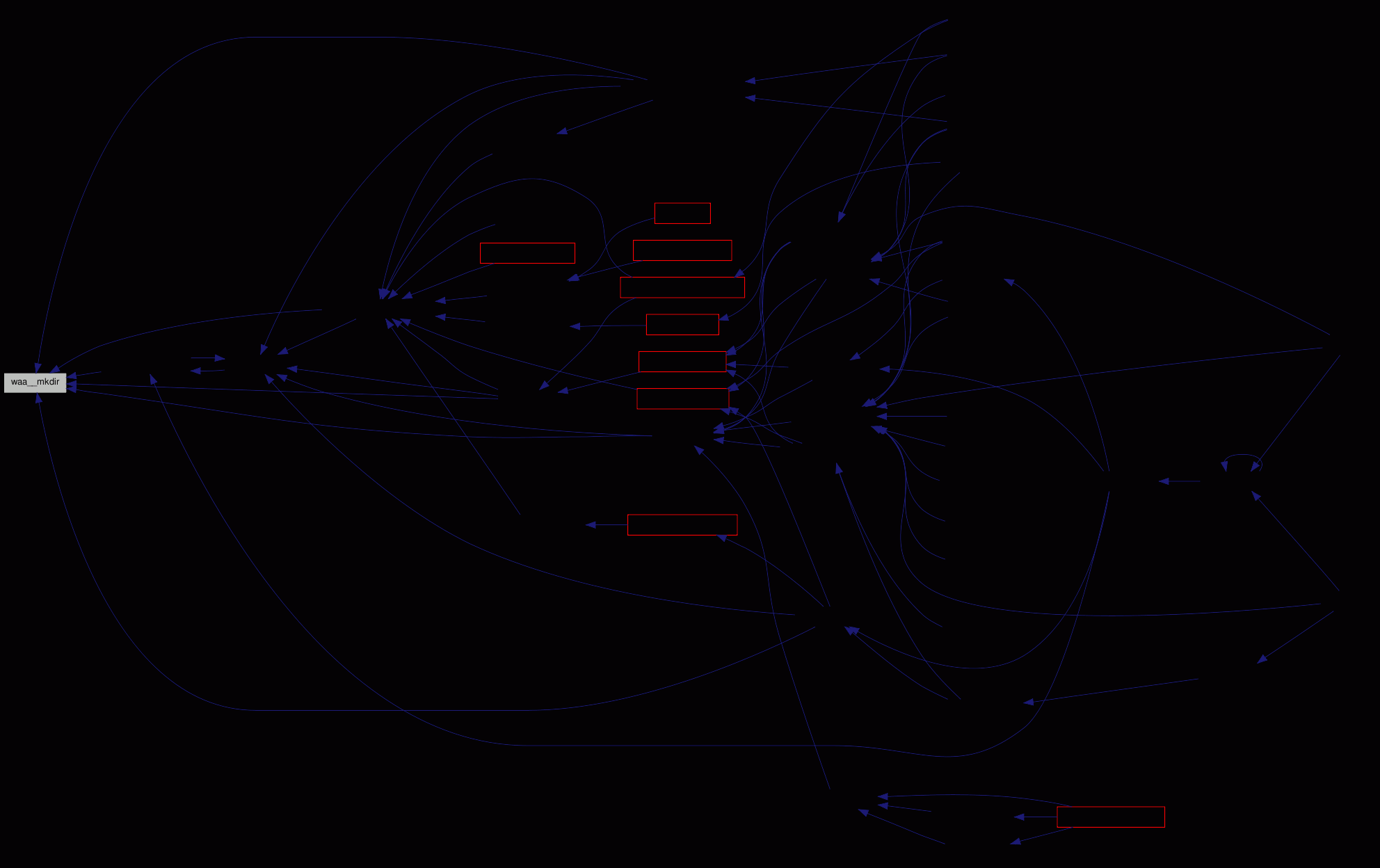
| int waa__mkdir_mask | ( | char * | dir, | |
| int | including_last, | |||
| int | mask | |||
| ) |
-.
Create a directory; ignore EEXIST.
If it already exists, no error is returned.
If needed, the structure is generated recursively.
With including_last being 0 you can give a filename, and make sure that the directories up to there are created. Because of this we can't use apr_dir_make_recursive() - We'd have to cut the filename away, and this is done here anyway.
Definition at line 354 of file waa.c.
References BUG_ON, DEBUGP, PATH_SEPARATOR, STOPIF, STOPIF_CODE_ERR, and waa__mkdir().
Referenced by rev___undo_change(), and waa__mkdir().

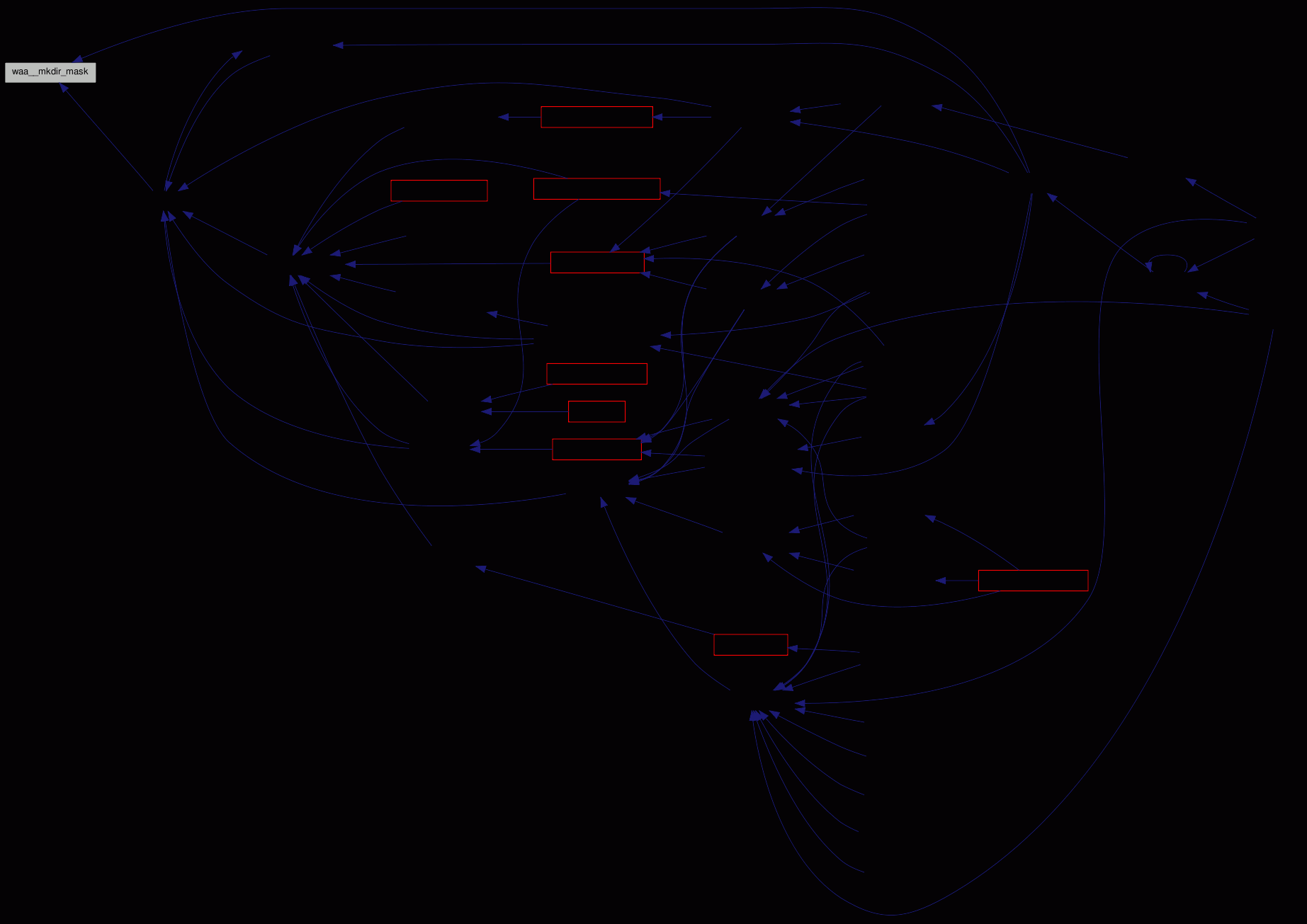
| int waa__new_entry_block | ( | struct estat * | entry, | |
| int | count, | |||
| struct waa__entry_blocks_t * | previous | |||
| ) |
-.
Insert an entry block with count entries into the waa__entry_blocks list, to get it updated later by waa__update_tree().
Definition at line 2684 of file waa.c.
References waa__entry_blocks_t::count, waa__entry_blocks_t::first, hlp__alloc(), waa__entry_blocks_t::next, waa__entry_blocks_t::prev, and STOPIF.
Referenced by waa__insert_entry_block().

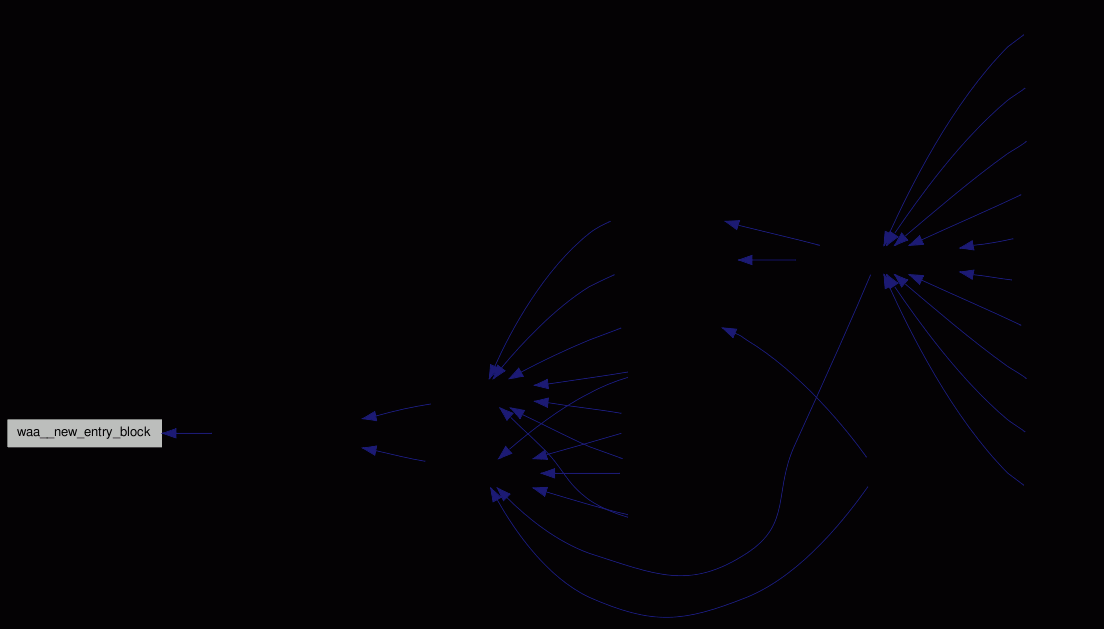
| int waa__open | ( | char * | path, | |
| const char * | extension, | |||
| int | flags, | |||
| int * | filehandle | |||
| ) |
Base function to open files in the WAA.
For the flags the values of creat or open are used; the mode is 0777, so take care of your umask.
If the flags include one or more of O_WRONLY, O_TRUNC or O_RDWR the file is opened as a temporary file and must be closed with waa__close(); depending on the success value given there it is renamed to the destination name or deleted.
This temporary path is stored in a per-filehandle array, so there's no limit here on the number of written-to files.
If the flags include O_APPEND, no temporary file is used, and no filehandle is stored - do simply a close().
For read-only files simply do a close() on their filehandles.
Does return ENOENT without telling the user.
- Note:
- If extension is given as
NULL, only the existence of the given WAA directory is checked. So the caller gets a0or an error code (likeENOENT); flags and filehandle are ignored.
Definition at line 586 of file waa.c.
References action, BUG_ON, DEBUGP, waa___temp_names_t::dest_name, ext_tmp, hlp__lstat(), hlp__realloc(), hlp__strdup(), actionlist_t::is_readonly, PATH_SEPARATOR, STOPIF, target_name_array_len, waa___temp_names_t::temp_name, waa__get_gwd_flag(), waa__get_waa_directory(), and waa__mkdir().
Referenced by waa__find_common_base2(), and waa__open_byext().
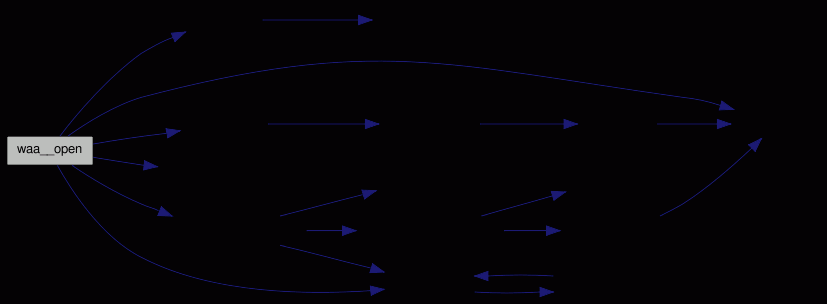
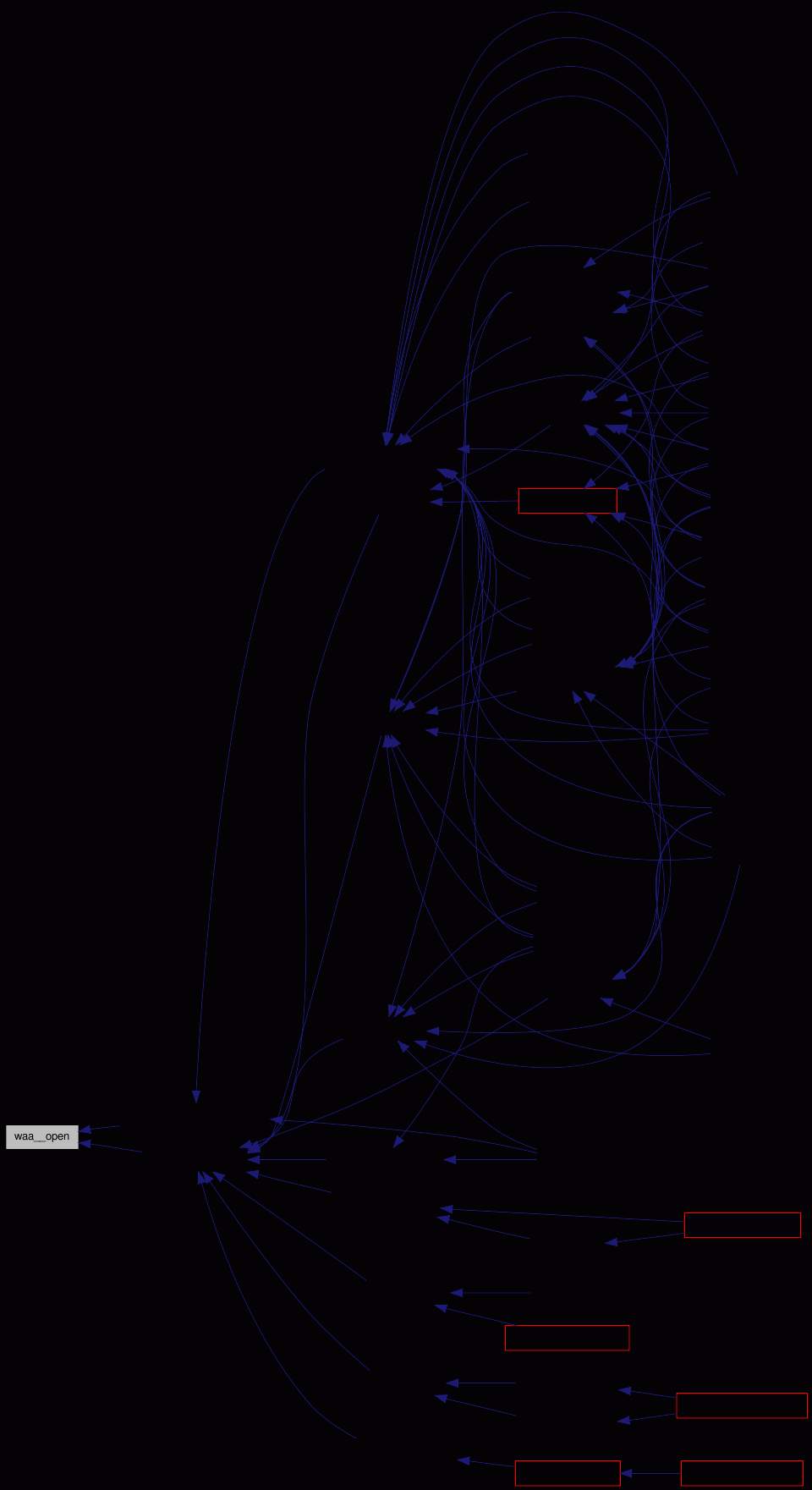
| int waa__open_byext | ( | char * | entry_name, | |
| char * | extension, | |||
| int | mode, | |||
| int * | fh | |||
| ) |
-.
Wrapper function for waa__open().
The entry_name may be NULL; then the current working directory is taken. write is open mode, like used for open(2) (O_CREAT | O_WRONLY | O_TRUNC) and is given to waa__open().
ENOENT is returned without giving an error message.
Definition at line 904 of file waa.c.
References IF_FREE, STOPIF, waa__given_or_current_wd(), and waa__open().
Referenced by cs___update_manber(), cs__read_manber_hashes(), ign__load_list(), ign__save_ignorelist(), res__mark_conflict(), res__remove_aux_files(), url__load_list(), url__output_list(), and waa__open_dir().
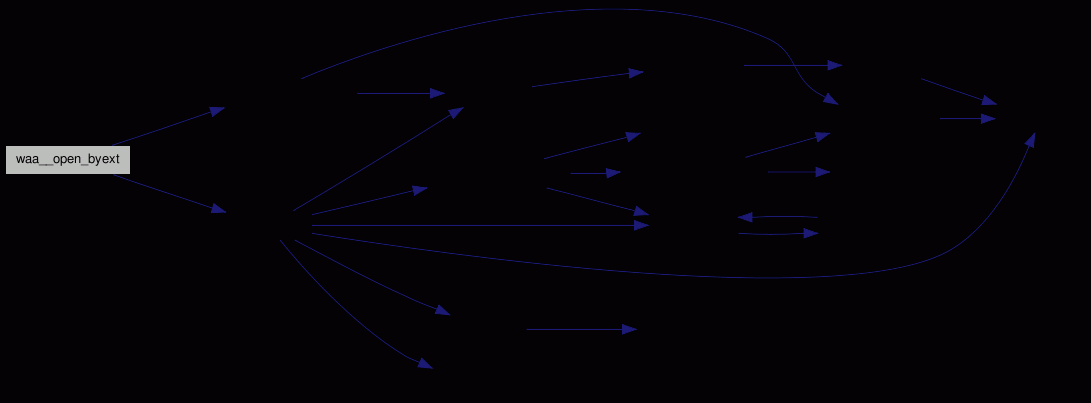
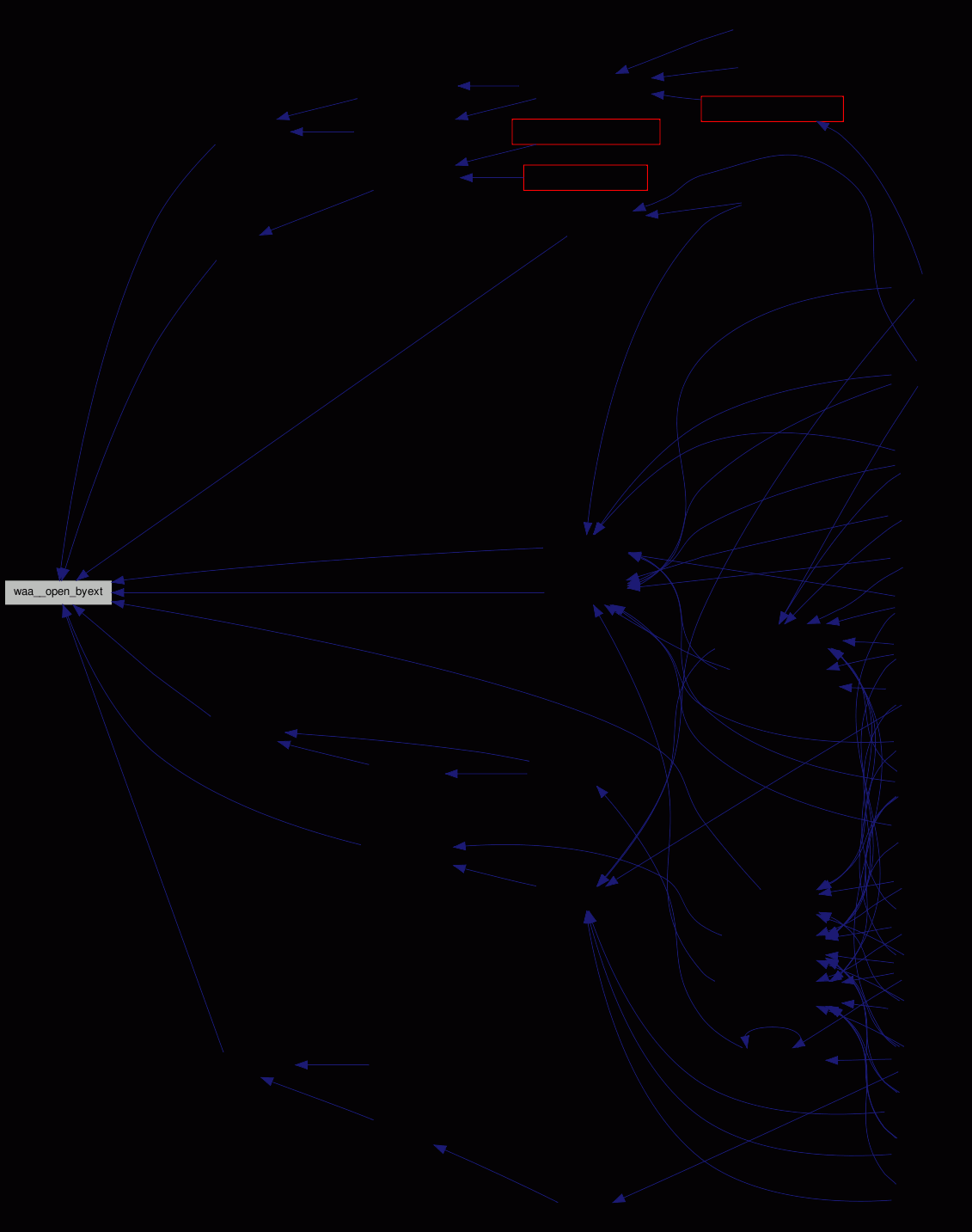
| int waa__open_dir | ( | char * | wc_base, | |
| int | write, | |||
| int * | fh | |||
| ) |
-.
Wrapper function.
Definition at line 929 of file waa.c.
References WAA__DIR_EXT, and waa__open_byext().
Referenced by waa__input_tree(), and waa__output_tree().

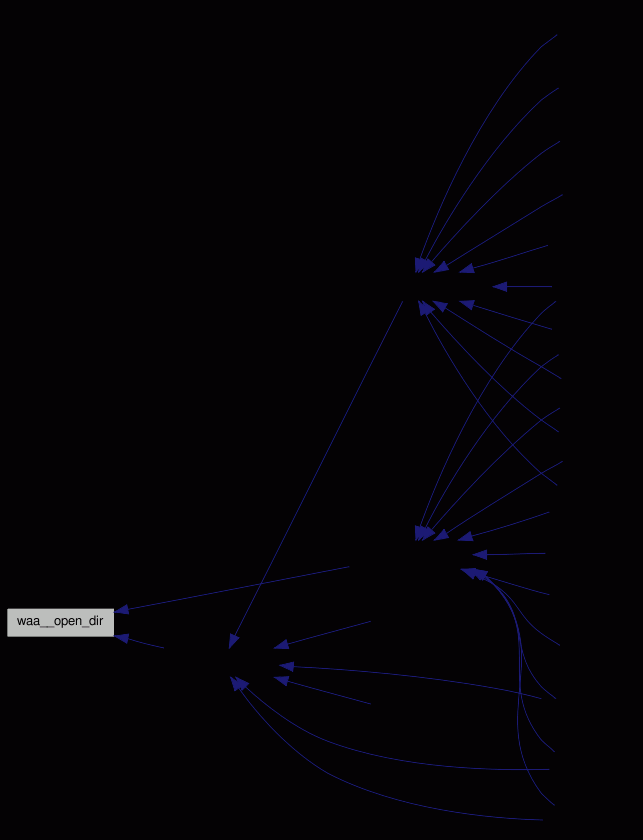
| int waa__output_tree | ( | struct estat * | root | ) |
-.
Write the dir file for this root .
Here the complete entry tree gets written to a file, which is used on the next invocations to determine the entries' statii. It contains the names, sizes, MD5s, devices, inode numbers, parent, mode and time informations, and a reference to the parent to re-build the tree.
- Todo:
- Currently hardlinks with duplicate inode-numbers are not well done in fsvs.
Format
This file has a single header line with a defined length; it is padded before the newline with spaces, and the last character before the newline is a $ . The other lines have space-delimited fields, and a \0 delimited name at the end, followed by a newline.
Order of entries in the file
We always write parents before childs, and (mostly) lower inode numbers before higher; mixing the subdirectories is allowed. This allows us to rebuild the tree in one pass (because the parents are already known), and gives us nearly linear reading on the storage media (because the inodes are mostly in harddisk order, there's not much back-seeking necessary).
As a consequence the root entry . is always the first one in the written file.
- Note:
- If we were going strictly in inode-order, we would have to jump over some entries (if the parent directory has a higher inode number than this entry and the [hard disk] head is already further down), and then have a second run through ... (or possibly a third, and so on). That's more complexity than wanted, and doesn't bring performance. So currently only one run; hard disk must move back sometimes.
directory Array
We use one array, named directory , to store pointers in the estat::by_inode arrays we're traversing (which are defined to be NULL-terminated).
We just have to find the next inode in the active directories; they are already sorted by inode, so that's very easy.
Here's a small drawing in ASCII, followed by a graphviz version.
* (struct estat) * ^ * | * xxxxxxxxxxxxxxxxN xxxxxxxxxxxxxxxN xxN xxxxN * ^ ^ ^ ^ * /->d >-/ | | | * | d >----------------------------/ | | * | d >------------------------------------/ | * | d >------------------------------------------------/ * | * directory *
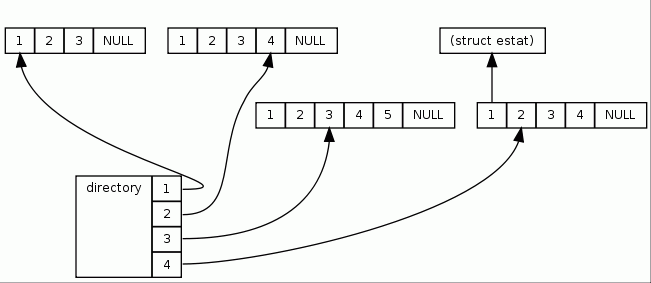
The x's are the by_inode-arrays of pointers to struct, NULL-terminated.
The d's show the directories-array with 4 entries.
We don't really store the parent inode numbers in the file; that wouldn't be enough, anyway - as soon as there are two or more filesystems, they would collide.
So instead of the inode number we store the number of the entry *in the file*; so the root inode (which is always first) has parent_ino=0 (none), its children get 1, and so on. That means that as long as we allocate the memory block in a single continuous block, we don't have to search any more; we can just reconstruct the pointers to the parent. We keep the directory-array sorted; so we have to insert a new directory at the correct position, but can otherwise output very fast. So for the array [10 20 30 40 50 60 70] the element 10 is written; the next one, say 35, is inserted at the correct position: [20 30 35 40 50 60 70] Again the first (smallest) element is written, and so on.
Definition at line 1212 of file waa.c.
References BUG_ON, estat::by_inode, DEBUGP, dir___f_sort_by_inode(), dir__sortbyinode(), estat::entry_count, estat::file_index, HEADER_LEN, hlp__calloc(), hlp__realloc(), IF_FREE, sstat_t::ino, max_path_len, estat::name, ops__calc_path_len(), ops__has_children(), ops__save_1entry(), ops__should_entry_be_written_in_list(), estat::parent, estat::path_len, estat::st, STOPIF, STOPIF_CODE_ERR, estat::to_be_sorted, estat::url, waa___find_position(), waa__close(), waa__header_line, waa__open_dir(), WAA__WRITE, and WAA_VERSION.
Referenced by au__work(), bld__work(), ci__work(), cm__uncopy(), cm__work(), co__work(), prp__s_work(), res__work(), rev__work(), sync__work(), and up__work().
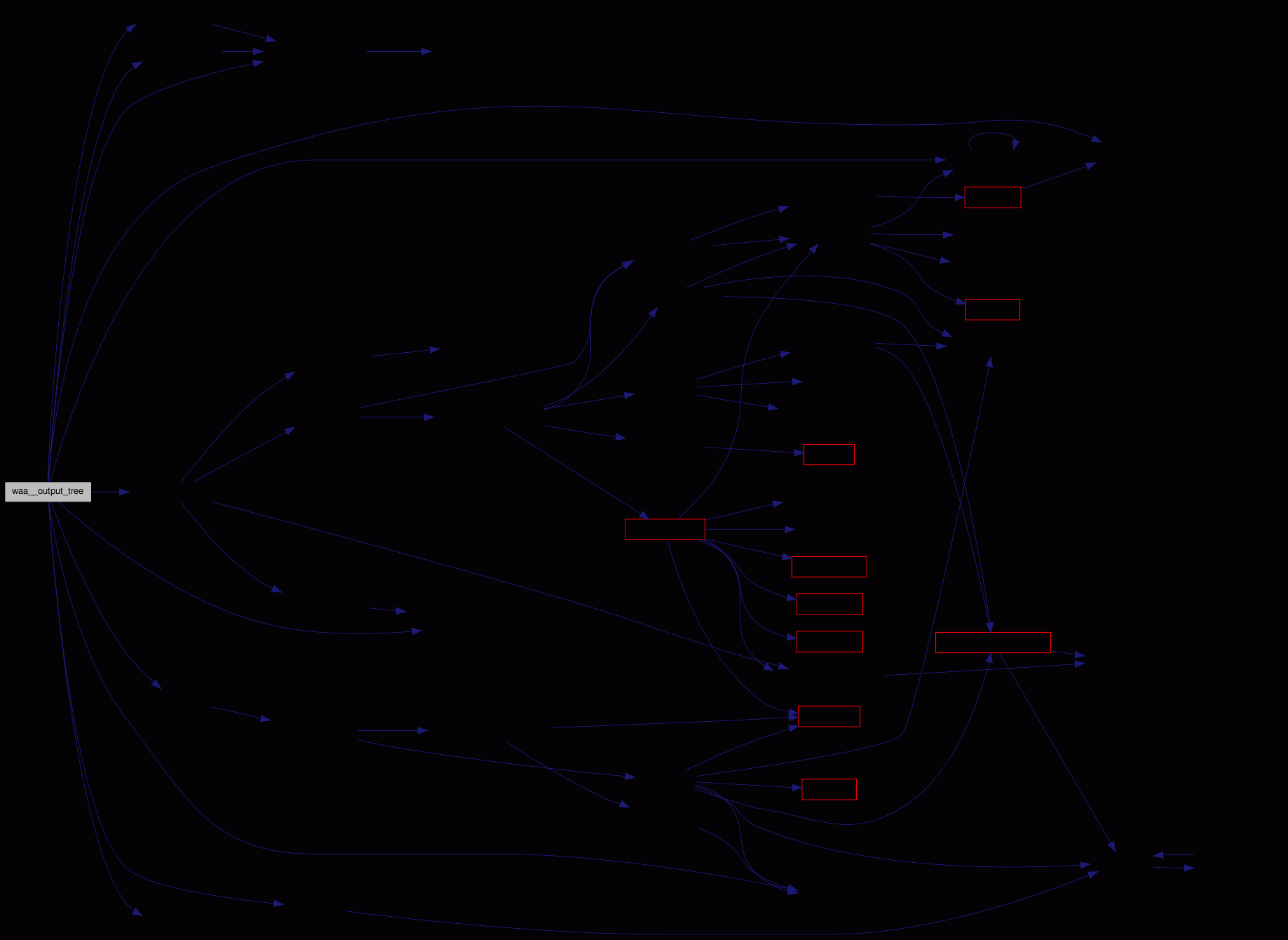
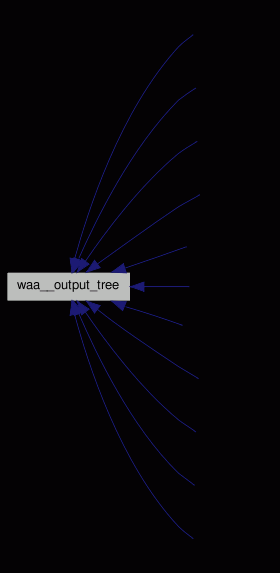
| int waa__partial_update | ( | struct estat * | root, | |
| int | argc, | |||
| char * | normalized[], | |||
| char * | orig[], | |||
| struct waa__entry_blocks_t * | blocks | |||
| ) |
-.
The given paths are looked for in the entries tree, are marked for update, and their parents are flagged.
We get a tree starting with root, and all entries from normalized get estat::do_userselected and estat::do_this_entry set. These flag gets used by waa__update_tree().
Definition at line 2599 of file waa.c.
References estat::arg, BUG_ON, DEBUGP, estat::do_child_wanted, estat::do_this_entry, estat::do_userselected, estat::entry_status, estat::flags, FS_NEW, hlp__lstat(), ops__calc_filter_bit(), OPS__CREATE, OPS__FAIL_NOT_LIST, OPS__ON_UPD_LIST, ops__traverse(), ops__update_single_entry(), OPT__PATH, estat::parent, PATH_PARMRELATIVE, RF_ADD, RF_ISNEW, estat::st, STOPIF, STOPIF_CODE_ERR, and waa__update_tree().
Referenced by waa__read_or_build_tree().
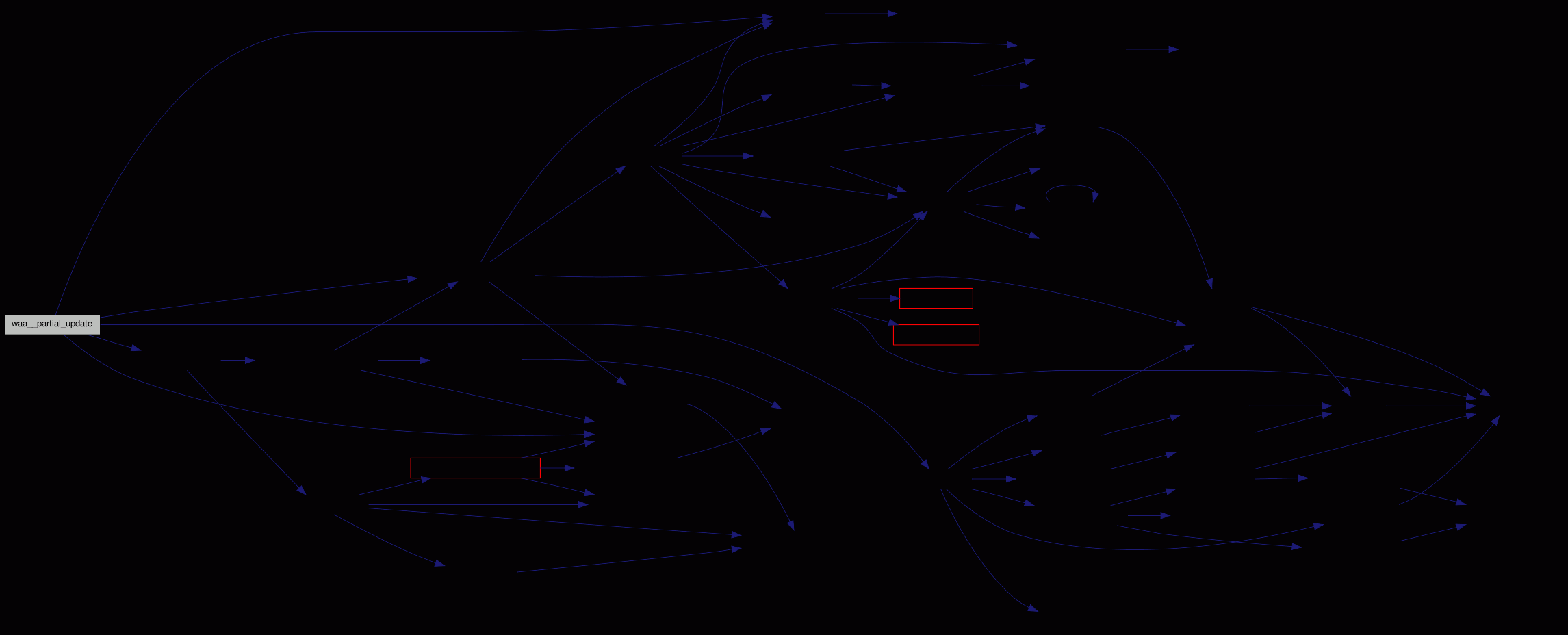
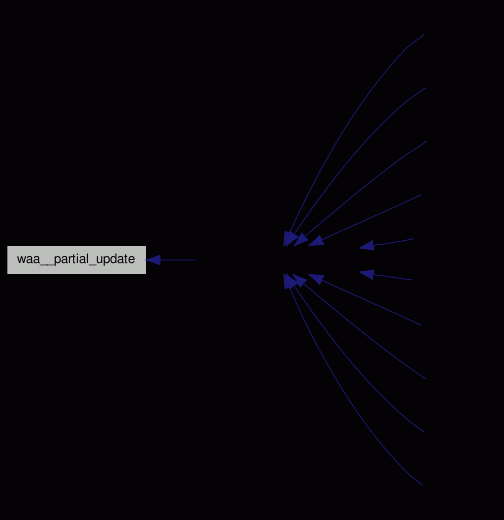
| int waa__read_or_build_tree | ( | struct estat * | root, | |
| int | argc, | |||
| char * | normalized[], | |||
| char * | orig[], | |||
| action_t * | callback, | |||
| int | return_ENOENT | |||
| ) |
-.
Reads the entry tree or, if none stored, builds one.
argc and normalized tell which entries should be updated.
We return the -ENOENT from waa__input_tree() if no working copy could be found. ENOENT is returned for a non-existing entry given on the command line.
The callback is called for every entry read by waa__input_tree(), not filtered like the normal actions.
Definition at line 2203 of file waa.c.
References action, DEBUGP, hlp__match_path_envs(), actionlist_t::local_uninit, OPT__PATH, PATH_CACHEDENVIRON, STOPIF, waa__input_tree(), and waa__partial_update().
Referenced by au__work(), ci__work(), cm__detect(), df__work(), ign__work(), info__work(), res__work(), rev__work(), st__work(), and up__work().
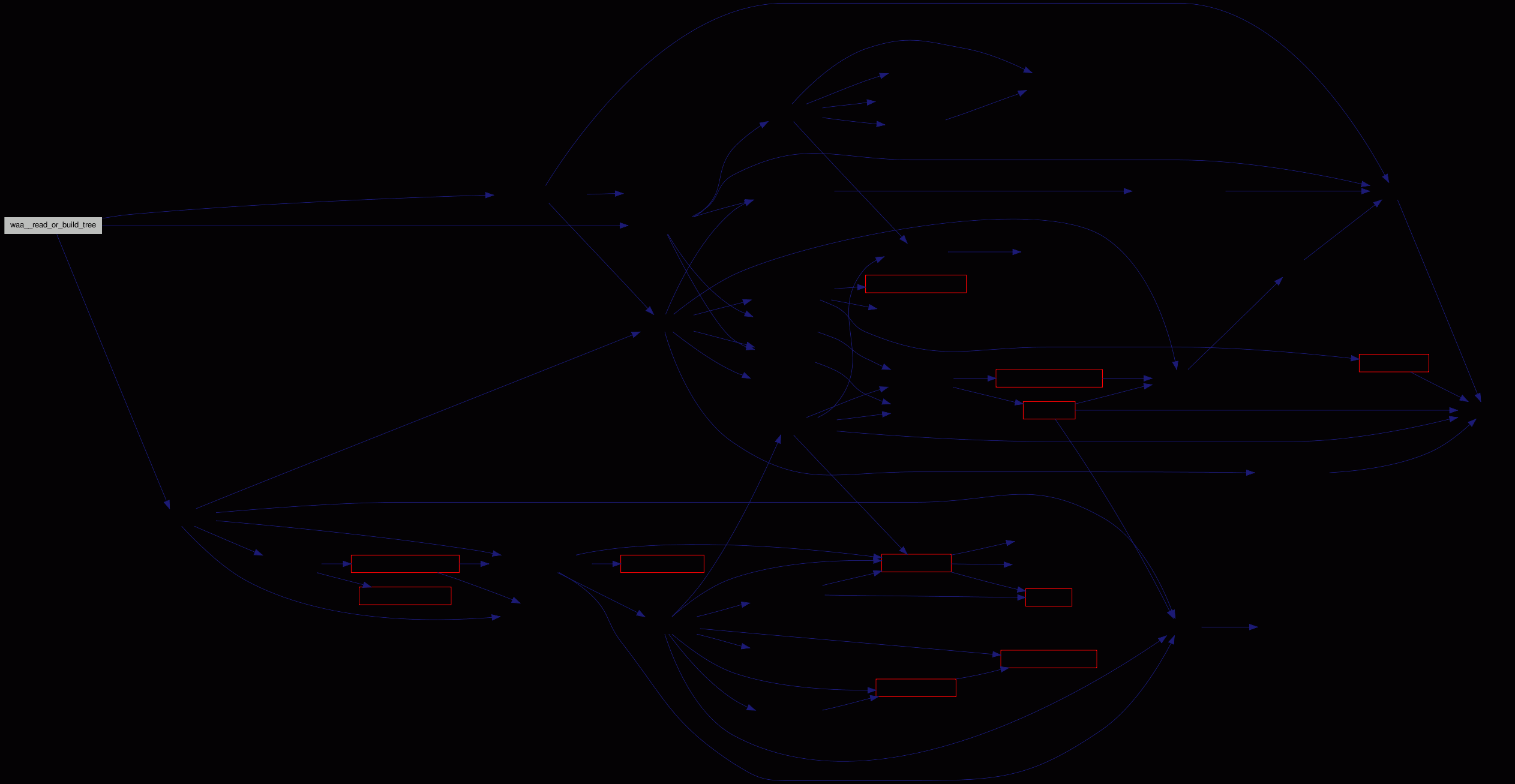
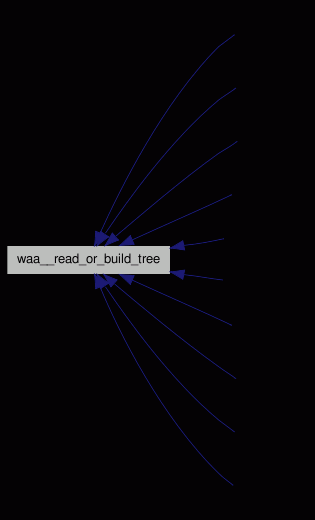
| int waa__save_cwd | ( | char ** | where, | |
| int * | ret_len, | |||
| int | additional | |||
| ) |
-.
Store the current working directory.
This is more or less a portable reimplementation of GNU getcwd(NULL,0) ... self-allocating the needed buffer.
where gets the cwd, and must be free()d; the optional ret_len can be set to the actual length of the cwd.
If the caller wants to append some path to the end, and knows how many bytes are needed, the additional bytes can be requested.
If the cwd has been removed, we get ENOENT. But returning that would not necessarily signal a fatal error to all callers, so we return ENOTDIR in that case.
Definition at line 294 of file waa.c.
References hlp__realloc(), STOPIF, and STOPIF_CODE_ERR.
Referenced by co__work(), main(), waa___get_path_md5(), and waa__given_or_current_wd().

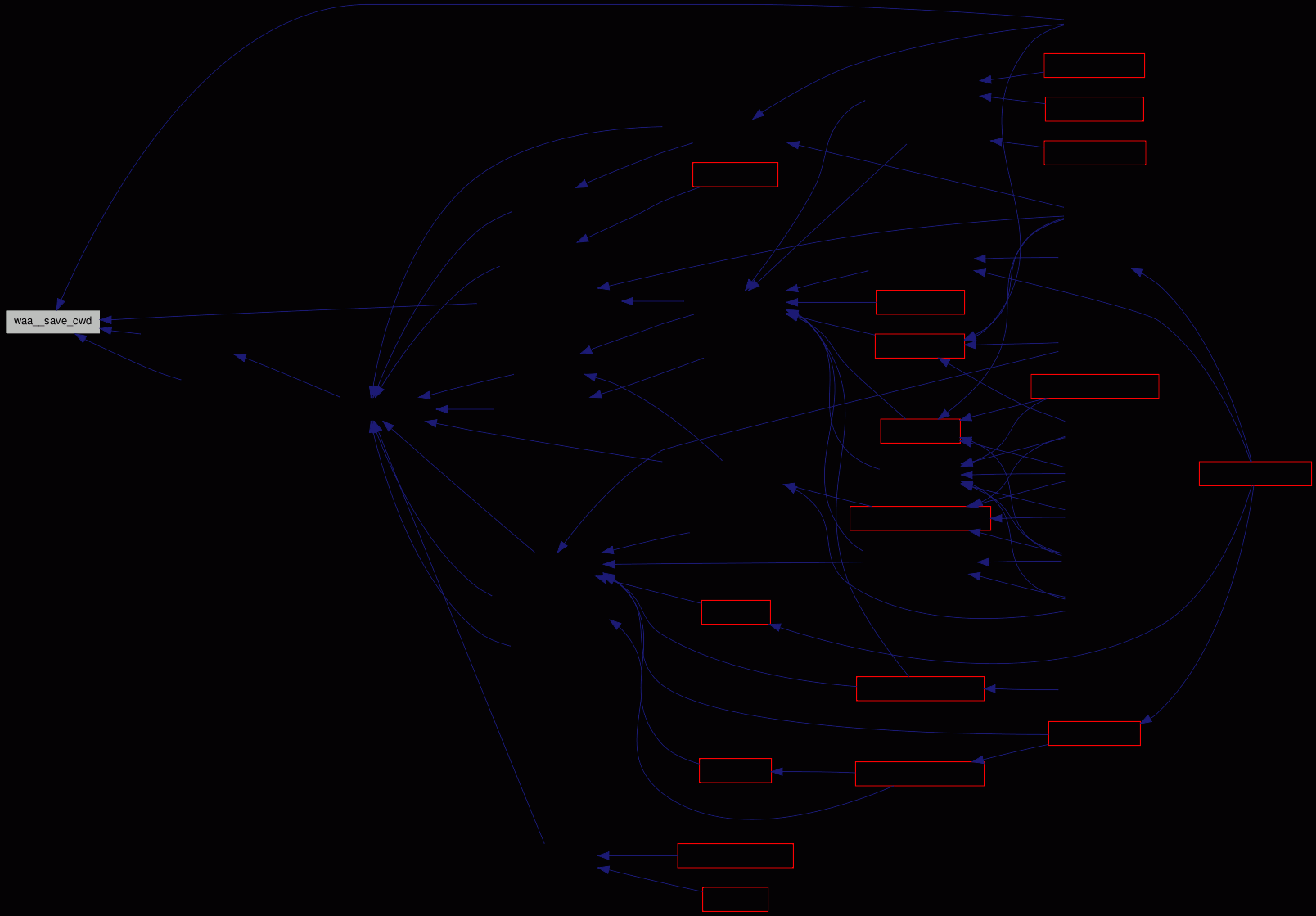
| int waa__set_working_copy | ( | const char const * | wc_dir | ) |
-.
Stores the path of the working copy.
The dir must be absolute; this function makes an own copy, so the value will be unchanged.
Definition at line 2998 of file waa.c.
References BUG_ON, hlp__strnalloc(), PATH_SEPARATOR, STOPIF, wc_path, and wc_path_len.
Referenced by url__work(), and waa__create_working_copy().


| int waa__update_dir | ( | struct estat * | old | ) |
Checks for new entries in this directory, and updates the directory information.
Gets called after all expected (known) entries of this directory have been (shallowly!) read - so subdirectories might not yet be up-to-date yet.
The estat::do_this_entry and estat::do_userselected flags are set, and depending on them (and opt_recursive) estat::entry_status is set.
On chdir() an eventual EACCES is ignored, and the "maybe changed" status returned.
Definition at line 1430 of file waa.c.
References ac__dispatch, approx_entry_count, estat::by_inode, estat::by_name, DEBUGP, estat::entry_count, estat::entry_status, estat::flags, FS_LIKELY, FS_NEW, IF_FREE, ign__is_ignore(), sstat_t::mode, estat::name, ops__are_children_interesting(), ops__build_path(), ops__correlate_dirs(), ops__free_entry(), ops__mark_changed_parentcc, ops__mark_parent_cc, ops__new_entries(), ops__set_todo_bits(), OPT__FILTER, estat::parent, RF_ISNEW, estat::st, STOPIF, STOPIF_CODE_ERR, waa__build_tree(), and waa__dir_enum().
Referenced by waa___check_dir_for_update().
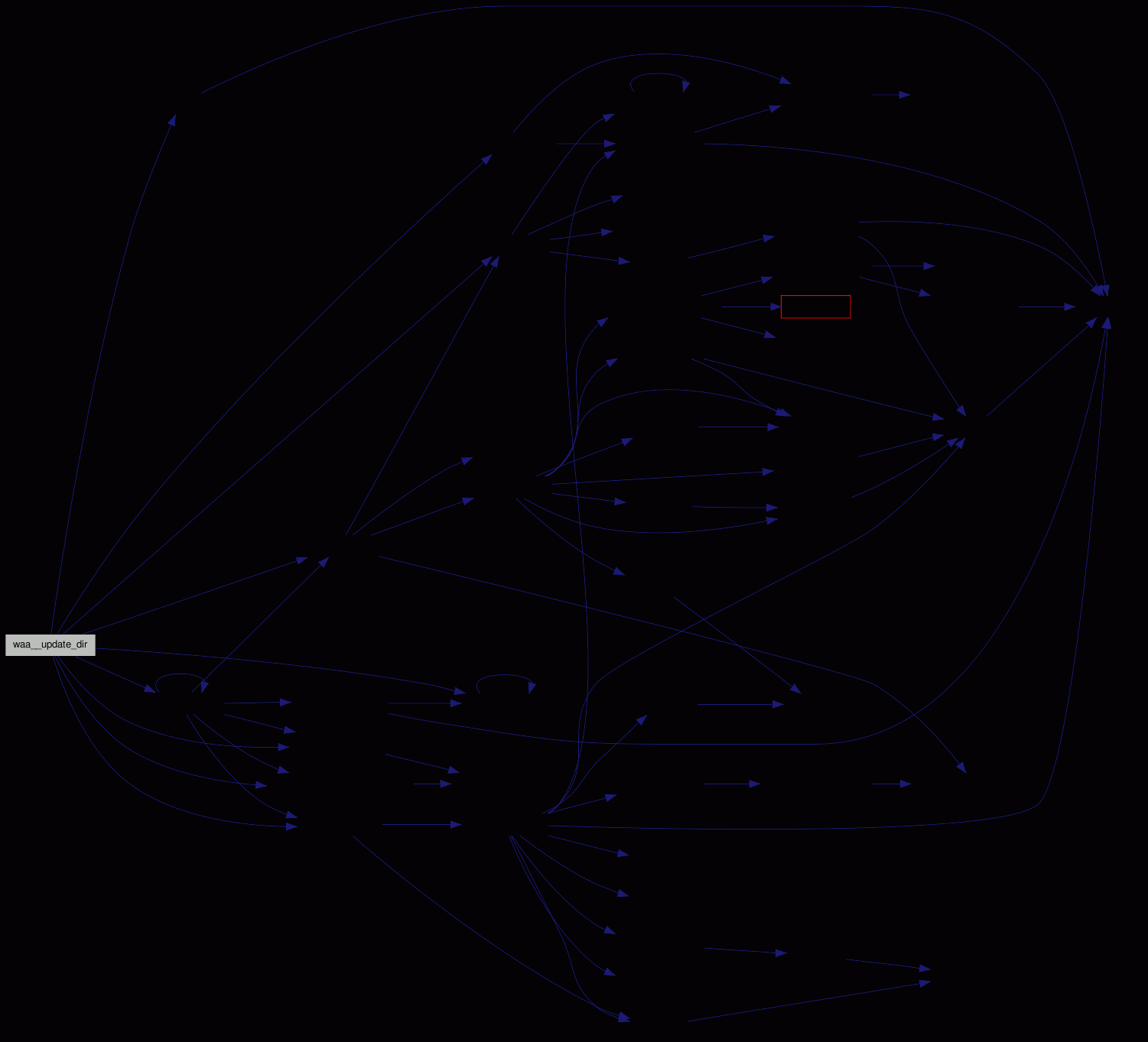
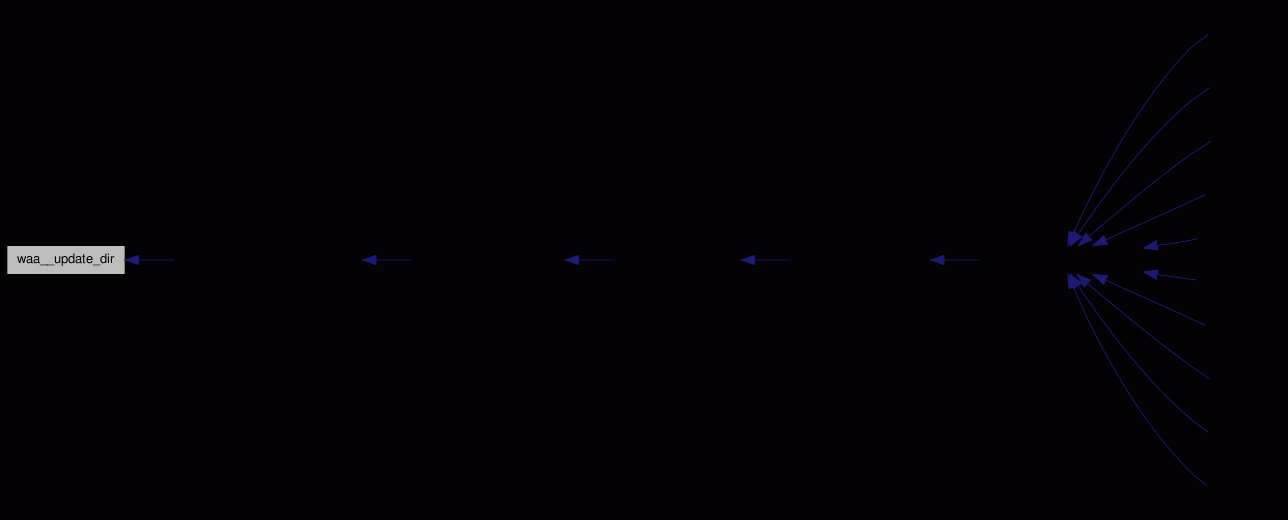
| int waa__update_tree | ( | struct estat * | root, | |
| struct waa__entry_blocks_t * | cur_block | |||
| ) |
-.
This function traverses the tree and sets entry_status for the marked entries.
On input we expect a tree of nodes starting with root; the entries that need updating have estat::do_userselected set, and their children get marked via ops__set_todo_bits().
On output we have estat::entry_status set; and the current action->local_callback gets called.
It's not as trivial to scan the inodes in ascending order as it was when this part of code was included in waa__input_tree(); but we get a list of (location, number) blocks to run through, so it's the same performance-wise.
This function consumes the list of entry blocks, ie. it destroys their data - the first pointer gets incremented, count decremented.
Threading
We could use several threads, to get more that one lstat() to run at once. I have done this and a patch available, but testing on linux/x86 on ext3 seems to readahead the inodes, so the wall time got no shorter.
If somebody wants to test with threads, I'll post the patch.
For threading there has to be some synchronization - an entry can be done only if its parent has been finished. That makes sense insofar, as when some directory got deleted we don't need to lstat() the children - they must be gone, too.
KThreads
On LKML there was a discussion about making a list of syscalls, for getting them done without user/kernel switches. (About 2007 or so? Don't even know whether that was merged in the end.)
On cold caches this won't really help, I think; but I didn't test whether that would help for the hot-cache case.
Design
- If the parent of the current entry is removed, this entry is too; skip the other checks.
- Check current status.
-
All entries that are not a directory now can be printed immediately; decrement parent's
unfinishedcounter. -
Directory entries
-
These increment their parent's
unfinishedvalue, as they might have children to do. -
If they have no known entries (have been empty) they may get checked for changes (
waa__update_dir()), and are finished - decrement parent'sunfinishedcounter. -
Else they wait for their
child_indexvalue to reach theentry_countnumber; then, as soon as theirunfinishedvalue gets zero, they're really done.
-
These increment their parent's
-
If a directory has no more
unfinishedentries, it can be checked for changes, and is finished - decrement parent'sunfinishedcounter.
The big obstacle is that arbitrary (sub-)paths might be wanted by the user; so we have to take great care about the child-counting.
Definition at line 2023 of file waa.c.
References ac__dispatch, action, estat::by_inode, estat::by_name, estat::child_index, waa__entry_blocks_t::count, DEBUGP, estat::do_child_wanted, estat::do_filter_allows, estat::do_filter_allows_done, estat::do_this_entry, estat::do_userselected, estat::entry_count, estat::entry_status, waa__entry_blocks_t::first, estat::flags, FS_CHANGED, FS_LIKELY, FS_REMOVED, FS_REPLACED, actionlist_t::keep_children, estat::local_mode_packed, sstat_t::mode, estat::name, waa__entry_blocks_t::next, estat::old_rev_mode_packed, ops__mark_parent_cc, ops__update_filter_set_bits(), PACKED_to_MODE_T, estat::parent, RF_ISNEW, estat::st, STOPIF, estat::strings, TEST_PACKED, estat::unfinished, and waa___finish_directory().
Referenced by waa__partial_update().
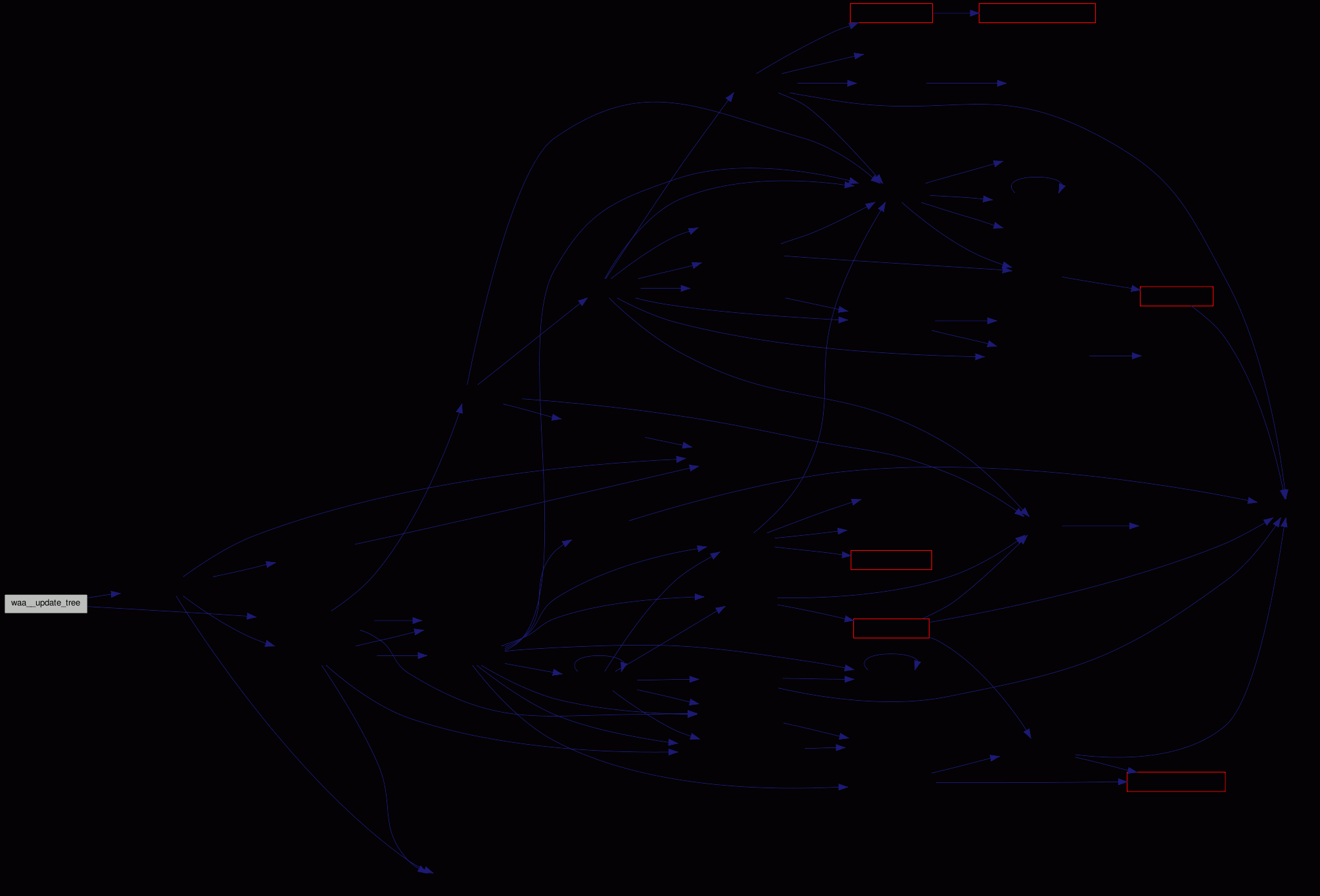
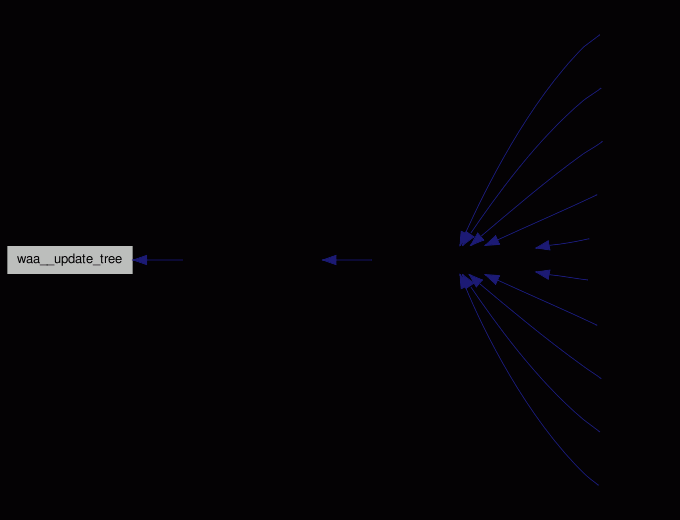
Variable Documentation
| char * conf_tmp_fn |
Definition at line 63 of file waa.c.
Referenced by main(), waa__get_waa_directory(), and waa__init().
| char * conf_tmp_path |
Definition at line 63 of file waa.c.
Referenced by main(), waa__get_waa_directory(), and waa__init().
const char ext_tmp[] = ".tmp" [static] |
The extension temporary files in the WAA get.
Definition at line 54 of file waa.c.
Referenced by waa__init(), and waa__open().
unsigned max_path_len [static] |
The maximum path length encountered so far.
Stored in the dir-file, to enable construction of paths without reallocating.
Definition at line 72 of file waa.c.
Referenced by waa__input_tree(), and waa__output_tree().
struct waa___temp_names_t* target_name_array = NULL [static] |
This array stores the target names.
Writes to the waa-area use temporary files, which get renamed on waa__close().
int target_name_array_len = 0 [static] |
How many entries have been in use in the target_name_array.
Definition at line 93 of file waa.c.
Referenced by waa__open().
-.
First block for to-be-updated pointers.
Definition at line 99 of file waa.c.
Referenced by waa__input_tree(), and waa__insert_entry_block().
| const char waa__header_line[] = "%u %lu %u %u %u %u" |
The header line of the dir-files.
Consists of
- header version (for verification),
- header length (for verification),
- number of entries (for space allocation),
- subdirectory count (currently only informational),
- needed string space (in bytes),
- length of longest path in bytes.
Definition at line 120 of file waa.c.
Referenced by waa__input_tree(), and waa__output_tree().
The meta-data for the WAA base directory.
The WAA itself doesn't get committed; checked via this inode.
Definition at line 68 of file waa.c.
Referenced by waa__dir_enum(), and waa__init().
| char * waa_tmp_fn |
Definition at line 63 of file waa.c.
Referenced by hsh___new_bare(), waa__get_waa_directory(), and waa__init().
| char* waa_tmp_path |
-.
Buffers for temporary filename storage.
They are long enough to hold the waa path plus the 3-level deep subdirectory structure for cache and data files. The conf path plus additional data gets it own buffers.
Definition at line 63 of file waa.c.
Referenced by hsh___new_bare(), waa__get_waa_directory(), and waa__init().
| int waa_tmp_path_len |
-.
Length of paths of temporary files.
Definition at line 96 of file waa.c.
Referenced by ign___load_group(), and waa__init().
| char* wc_path |
-.
Our current WC base.
Valid after a successfull call to waa__find_common_base().
Definition at line 104 of file waa.c.
Referenced by cm___dump_list(), cm___get_base_source(), cm___make_copy(), cm___not_below_wcpath(), cm__detect(), delay__work(), hlp__format_path(), hlp__match_path_envs(), ign___load_group(), ign__compile_pattern(), ign__save_ignorelist(), sync__work(), url__load_nonempty_list(), waa__create_working_copy(), waa__find_common_base2(), waa__get_waa_directory(), and waa__set_working_copy().
| int wc_path_len |
-.
How much bytes the wc_path has.
Definition at line 106 of file waa.c.
Referenced by cm___not_below_wcpath(), hlp__format_path(), hlp__match_path_envs(), ign__compile_pattern(), ign__work(), waa__find_common_base2(), and waa__set_working_copy().
 1.6.1
1.6.1